#alchemy meta
Explore tagged Tumblr posts
Text
Venti and Diona's interaction in the alchemy event is so special to me... because Diona is someone who really hasn't had any reliable parental figures in her life at all. Her father is a drunkard who barely has any time for her. She got her vision because she walked into the pouring rain as a child, all alone, terrified, to look for her drunk father in a forest full of animals and monsters and bring him home. Her father takes better care of Razor than her. She was so lonely she talked to a spring in the hopes that the rumours were true and there really was a fairy inside, listening. And then the voices that used to answer stopped, too. Leaving her with nothing but a curse- any drink she mixed would be divine. She's only twelve at most and she works in a bar. Her employer exploits her skills for profit. There's advertisements around Mondstadt advertising Diona's drinks specifically. Everyone loves them. Diona hates them. Everyone tells her how lovely her drinks are. Diona herself, despite despising alcohol, is proud of her skills. That's so fucked up. That's all so fucked up.
There's so many jokes about "haha child wants to destroy the wine industry but works in a bar" and while I can see why people find it funny they're honestly...so tasteless. Diona is a child who villainizes alcohol because she can't bear the thought of her father being at fault for his actions because she loves him so much. That he could drink less and he could spend more time with her and he could help her with her emotions but never does. That he could spend time with her and immerse himself in her interests but he never does. That he's willing to do all this for other people instead, but not her. That he chooses to do these things for other people, but he almost never chooses to do them for her.
But Venti does. Venti chooses to do all these things with Diona. He calls all residents of Mond his children and that's Diona too. He takes the time to search Dragonspine for an ingredient she might like, he chats with her and accompanies her to the location of the alchemy event, he presumably spends hours with her as she searches for ingredients and mixes her drink, keeping her company and making sure she's safe.
He doesn't have to do this. He doesn't have to patiently endear himself to her because he knows she hates people who drink, he doesn't have to bother going all the way to Dragonspine to find her something unique because he knows she's proud of her creations, he doesn't have to spend hours in the company of a lonely child who he has nothing in common with-but he does.
So many people would think he's doing it for the drink, but they all lack reading comprehension skills because I said so. Diona wants to create a drink which keeps people sober. Venti isn't going to get drunk and he's not doing it for the drink. It isn't pity either, it's affection- he loves his child and he wants to spend time with her and make sure she's safe. That's all. They're so special to me <3
Oh and another thing that I forgot to add- the Spring Fairy Diona talked to, Callirhoe, only found the spring in Springvale thanks to "a gentle breeze guiding her." The person who listened to the cries and rants of a lonely child was also coincidentally someone guided there by Venti. Still girlie why that specific blessing 😔
#i can't deal with it#i needed to get it out there#my heart#venti#diona#alchemy event#genshin impact#barbatos#genshin meta#diona katzlein
707 notes
·
View notes
Note
Do you think the colour of a polyjuice potion says anything about a person?? I just remembered that Harry's turned a bright gold and wondered if it meant anything
Yes, I think the color does say something about a person (and also the taste). We know different people cause the potion to turn different color and taste:
“Ooh, you look much tastier than Crabbe and Goyle, Harry,” said Hermione, before catching sight of Ron’s raised eyebrows, blushing slightly, and saying, “Oh, you now what I mean—Goyle’s potion looked like bogies.”
(DH, Ch4)
So, let's look at all the Polyjuice potions we see.
Harry Potter:
Harry dropped the hair into the mudlike liquid. The moment it made contact with its surface, the potion began to froth and smoke, then, all at once, it turned a clear, bright gold. [...] Ron, Hermione, Fred, George, Fleur, and Mundungus drank. All of them gasped and grimaced as the potion hit their throats.
(DH, Ch4)
Bellatrix Lestrange:
“She tasted disgusting, worse than Gurdyroots! Okay, Ron, come here so I can do you . . . .”
(DH, Ch26)
Mafalda Hopkirk:
Hermione drank the Polyjuice Potion, which was now a pleasant heliotrope color [purple]
(DH, Ch12)
Millicent Bulstrode's Cat:
The potion hissed loudly like a boiling kettle and frothed madly. A second later, it had turned a sick sort of yellow
(CoS, Ch12)
Vincent Crabbe:
Crabbe’s a dark, murky brown.
(CoS, Ch12)
Gregory Goyle:
Goyle’s turned the khaki color of a booger
[...]
Pinching his nose, Harry drank the potion down in two large gulps. It tasted like overcooked cabbage
(CoS, Ch12)
And Ron actually calls the Polyjuice someone's "essence":
“Urgh — essence of Millicent Bulstrode,” said Ron, eyeing it with loathing. “Bet it tastes disgusting.”
(CoS, Ch12)
And I think he isn't far off.
I think Polyjuice does reveal the "essence" of a person in a way.
Hair and nail clippings have been used in irl alchemy (there are theories that the "hair" is a code name to refer to other minerals and it's sometimes unclear, but sometimes it definitely refers to hair. Really depends on the book) for centuries. Now, hairrepresents a residue of the body. When taken from a living person (like with polyjuice) the hair would represent the person, who they are.
Albertus Magnus (13th-century alchemist) wrote that more gold can be found in the hair taken from a human's head. Now, the gold he wrote about isn't actually gold, but gold in alchemy refers to purity. Basically, human head hair is good for extracting the pure essence of a person. Like Aristotle, he calls hair mostly a mix of Earth and Water — the elements of the physical plane, the body. But head hair, specifically, due to it's closeness to the brain is more than just the physical aspect. It's mostly the physical aspects, but it includes elements of the spirit of the person.
So, head hair is the best way alchemically to get the purest essence of someone's appearance (body and a bit of spirit).
So what do we learn about characters from their polyjuice?
Well, bitter people, taste bitter. Crabbe, Goyle, Millicent, and Bellatrix all tasted terrible according to the Golden Trio. They tasted terrible because they were terrible people.
What I want to note a bit here, is that Harry's didn't taste great either. Better than Crabbe, Goyle, or Bellatrix, but the Order is still described as gasping and grimacing at the taste. My guess, due to the language used, is that the taste of Harry's polyjuice wasn't exactly bad, per se, but was kinda strong and unexpected. What the taste was, we unfortunately don't know, nor could I find the color of the potion for Bellatrix (my guess would be an almost black dark green that's a bit translucent like you added a bit of coloring to water). But, let's look at the colors we do have.
Crabbe - Murkey Brown. Goyle - khaki color (both shades of brown), Millicent's cat - sickly yellow, Mafalda - a pleasant deep purple, and Harry is gold, but I'll keep him for last.
Brown (both Crabbe and Goyle) is reliable, simple, stable, and consistent. But it's also boring, dull, timid, and predictable. Since both are described as ugly browns, the intention is to evoke the negative symbolism of brown.
Yellow can be optimistic, intelligent, and warm, but it can also be cowardly and deceptive. Millicent's cat's yellow is specifically described as a sickly yellow — so, to me, it suggests her cat's unpleasant. But it's also not a potion meant to be used with animal hair, so who knows.
A purple like Mafalda's is interesting. It's described as a nice color, the positive symbolism of purple includes: wisdom, compassion, and royalty. But purple can also symbolize: oversensitivity, immaturity, or hypervigilance. I think, what it says about Mafalda is that she is a pleasant and compassionate person who is just invested in a shitty institution (the ministry). From the color of her potion, it seems she isn't a bad person. Additionally, heliotropes represent the sun, fire, and abundance — positive things.
Now, Harry's potion tuning gold is one of these really interesting things. You see, in Alchemy gold is everything that is pure and good and perfect. Gold is the purest form all materials want to achieve. The Philosopher's Stone, the symbol of immortality and perfection (it's the perfect material), can turn anything into gold. The Elixer of Life produced from the stone, in theory, would be in gold in color. Gold is the color of immortality and purity and perfection. It's the sun and fire and life and abundance and good fortune. Gold is the cure-all and be-all. Alchemists considered it indestructible, pure, and perfect:
But the alchemists were most deeply impressed by its apparent indestructibility: it does not tarnish in air or water, is not appreciably volatilized or oxidized in melting, and is not attacked by any chemical reagent then available. It was therefore regarded as the 'perfect' metal.
(Prof. Dorthy Wyckoff note in her translation of The Book of Minerals by Albertus Magnus)
This honestly really strengthens my theory that Harry was always the Master of Death. If the color that represents Harry's essence (his body and spirit, aka life) is gold — the color of immortality, perfection, and purity — it means he already is in his perfected form. He already is the philosopher Stone AKA Master of Death.
See, in alchemy, in the process of making the Philosopher's Stone, the alchemist is also working on themselves. The work is both on the minerals and on the alchemist. The alchemist would become their perfect, purest self while doing the "Great Work" and would only be able to create the Philosopher's Stone when they themselves, are also their purest ("golden") selves.
What I'm saying is that Harry, by his essence being bright gold, is implied to already be there at the perfection point. He is already at the point where he could make the Philosopher's Stone. So, him being the MoD and already sorta immortal, just really fits that.
Even in the world of HP the color "gold" is associated with immortality. The fire from Harry and Voldemort's wands is gold because of the Phoenix Feather core. Phoenix's in HP are associated with gold, which also connects gold to immortality. Again, this all hints at Harry being the MoD all along.
#harry potter#hp#hp meta#asks#anonymous#hollowedtheory#harry potter meta#harry james potter#hp magical theory#alchemy#bellatrix lestrange#gregory goyle#vincent crabbe
162 notes
·
View notes
Text
Judai and Yubel's Chemical Wedding
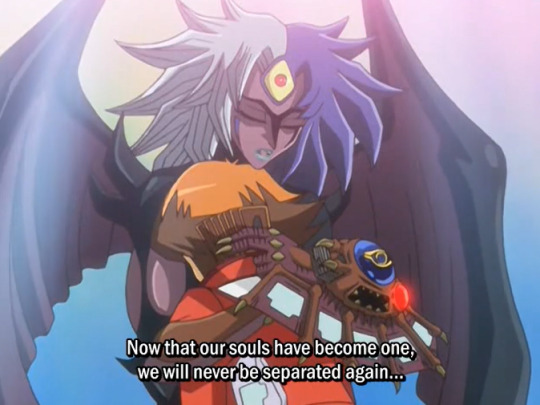
A chemical wedding is central to many alchemy stories.
A chemical wedding is a reconciliation of opposites, often with the most significant character relationship to the protagonist. A relationship which destroys and then remakes them in the better version of themselves.
Jung said that relatioships are chemical reaction. If you have a reaction you can never return to your previous state of being. That's ultimately the role of a chemical wedding in a story. A relationship which is central to a character's development, and changes both parties.
Yubel isn't just important for Judai's character development, they're literally his other half and their union of opposites completes them both in an alchemical sense. Keep on reading below the cut for a lesson in alchemy symbolism.
Peter Pan's Missing Shadow
So, the story goes somewhere in the middle of developing season two the writers recognizing that Judai, would never be able to handle a Marik level antagonist. He lacked maturity compared to the previous series protagonist Atem. The concept of Yubel emerged to make Judai grow, because as he was, he wasn't enough.
Judai fits the archetype of the hot-blooded shonen protagonist almost perfectly in the first two seasons, but even in two seasons where he changes very little as a character the hints are there.
Sho immediately puts Judai on a pedestal, and soon so does everyone else. Judai is praised for his pure heart over, and over. The standards for Judai are set so high you begin to wonder what if Judai wasn't the person everyone sees him as?
At this point is it even Judai that his friends are seeing?
What does that do to a person's identity when everyone around you is love with the idea of you. When you're not seen as a person with flaws.
Judai doesn't grow but how can he, when he's not really allowed to make mistakes. When he's expected to always be cheerful, and always bounce back without help or support.
Judai is pure of heart, but is anybody really pure? The light always casts a shadow.
Jung pioneered a lot of analytical psychology theory. Jung divided the psyche into four parts, the persona which is how we externally engage with the world our public face, the animus and anima masculinity and femininity, and finally the shadow.
Complementary to Jung’s idea of the persona, which is “what oneself as well as others thinks one is” [CW9 para 221], the “shadow is that hidden, repressed, for the most part inferior and guilt-laden personality [...] that is his shadow does not consist only of morally reprehensible tendencies, but also displays a number of good qualities, such as normal instincts, appropriate reactions, realistic insights, creative impulses etc “
The shadow isn't made up of bad qualities, just what we are afraid to show others because of judgement. Hidden as it may be, the shadow is a fundamental part of your personality.
Jung had a deep interest in the shadow – its form and content – and in the process of assimilating “the thing a person has no wish to be” [CW16, para 470]. He saw quite clearly that failure to recognize, acknowledge and deal with shadow elements is often the root of problems in relationships.
Is a friendship with someone real if you're afraid to show any of your flaws?
Juda's never allowed to make mistakes around his friends. He's under constant pressure to fight their battles, to fear he might lose them if he loses.
Ryo, a foil and rival Judai suffers a complete breakdown after losing just one duel. Before that he spelled it out for Judai in the graudation duel, the "perfection" everyone expected limited his growth, until he finally fell apart. If one loss makes Ryo fall then how much farther does Judai who's under more pressure have to fall?
Judai hides his shadow from everyone, but the shadow isn't just a part of you. The shadow is you. You are your shadow. Which is why recognizing the shadow is a critical part of growth - and alchemy. As Jung once said, "The gold is in the dark. And one does not become enlightened by imagining figures of light, but by making the darkness conscious.”
Judai's in unable to grow up, because like Peter Pan is missing his shadow. It needs to be retrieved and sewn back to his feet. Until then, he's stunted and missing an important part of himself.
Judai is missing something important without his shadow. I'm not pulling this from thin air, it's directly stated by the text repeatedly.
Here.
Kouji Satou: We have something that you lack. Judai: That I lack? Kouji Satou: Yes the darkness of the heart that slumbers deep within a duelist. The burden that a duelist bears in his heart. Judai, you have none of that.
Here.
Cobra: You are certainly a talented duelist. But you have one fatal flaw. Judai: A fatal flaw? Cobra: Yes, your duels are superficial. Someone who fights with nothing on his shoulders, cannot recover once he loses his enjoyment. What a duelist carries on his shoulders will become the power that supports him when he’s up against the wall! Cobra: But you have nothing like that! Those who go through life without anything like that cannot possibly seize victory. Cobra: But I know that nothing I say will resonate with you… because you have nothing to lose but the match.
Even, by Judai himself.
Judai: They’re all… They’re all gone. There really was something missing in me. But what is it? What was missing? What should a duelist burden themselves with?
I often worry people will misinterpret Judai's ending with Yubel is unhealthy because he's "caving to the demands of a stalker."
Yubel's not a stalker, they're not even a real person. Judai's a character in a story, experiencing an arc about learning to accept and grow path his worst flaws. How could that arc end with throwing away Yubel, who represents the ugliness Judai tries to hide?
Yubel is Judai's shadow, run away from him just like Peter Pan. Yubel's more than just a cast-off shadow though, Yubel is Judai. A good example of two separate characters coded as each other's shadows in other literature is Katherine and Heathcliff, two characters designed specifically to be two halves of a whole. Katherine once said, "I am Heathcliff", or to be specific she said:
My great miseries in this world have been Heathcliff’s miseries, and I watched and felt each from the beginning: my great thought in living is himself. If all else perished, and he remained, I should still continue to be; and if all else remained, and he were annihilated, the universe would turn to a mighty strange: I should not seem a part of it [...] Nelly, I am Heathcliff! Katherine - Wuthering Heights
So these are two different topics, shadow as a literary foil, and shadow as an aspect of peresonaity in Jungian psychology, yubel is both.
Yubel is the archetypal shadow character, a character who challenges the main character by being their internalized flaws made external.
In a Jungian text when a character won't look at their shadow, they're often forced to look by being confronted with an externalized version of their shadow.
This is the first line of dialogue Yubel says that's not chanting Judai's name in episode 117 to Amon.
Yubel: My power is not especially great. But those with darkness in their hearts can unleash great power in me. Yubel: The pus welling out of your injured heart forms a second heart. I can see that other heart. The darkness in it. Yubel: That's right. That is the darkness of your heart. it's there, in the depths of your mind. Th scream of your other heart, born from your stagnant blood!
Yubel's go-to strategy with manipulation is to throw in a character's face the secrets they've been hiding to make them more liable to their will. Until Yubel can reconstitute their own body, they're forced to act entirely through others, possessing Cobra, then Martin, and finally Johan.
Yubel, the runaway shadow can't exist in this world without glueing themselves onto someone else. Can't be whole without Judai.
Yubel: You'll formally become king. Yubel: It must be great to have your wishes come true. But then, who's going to be happy for you? Yubel: Living in a way that suits you. The one who'd be most happy for you would be that "echo" woman that you loved, am I right? Yubel: But you went and let her die. You won't even be able to see her celebrate, isn't that a bit weird to you? Amon: Silence... Yubel: I know I couldn't stand it. A world without the one I love. It's because of Judai I can feel pain, angiush, and agony.
They say it over and over again, a world without the person you love, even a perfect one like Amon imagines, isn't worth living in.
Yubel: I wouldn't want to live in such a world! Yubel: The world is a place that you make alongside the one you love! What Judai and I make together... that will be the world!
It seems like a one-sided dependence on Yubel's part, but because Yubel is Judai's shadow, Judai cannot exist without them either.
Yubel was literally introduced into the story to spur Judai's character growth after two seasons of stagnation.
Judai seems better off without Yubel. Judai even suggests as much, that it might have been better for Yubel to die in that crater, than crawl back to Judai in their wounded and hateful state.
It seems that Yubel's reapperance triggered Judai's breakdown, and without it the breakdown never would have happend. However, there's two seasons of foreshadowing that JUdai is "missing something" without Yubel, which is why they can't grow or adapt to new circumstances. Judai needed to go through a death of his old self, a loss of innocence to become someone new, that's how alchemy works, that's how growing up works.
JUdai needed to reintegrate his shadow (Yubel) so he could become aware of his flaws, and while he does hit a low point, in the aftermath he can finally better himself.
The question is what flaws of Judai does Yubel reflect?
At first brush they seem as opposed to each other as hero and villain.
There's a tragic symmetry to the way both of them lived their lives for the past ten years. They began in the same place, Judai's childhood was just the two of them together. Then Yubel drove all of Judai's friends away, and Judai sent Yubel away in return.
Ten years go by and Judai attends Duel Academy and makes friends for the first time. He learns of his destiny was the one to protect Neo-Space and the Neo-Spacians led him their power helping awake within him the power of the gentle darkness. Judai spends almost two years almost always surrounded by people, alone in the center of a crowd.
At the same time Yubel has spent the past ten years alone in space, crying out for help from Judai. When they finally return to earth they ask for help one final time only to be met with silence. In that moment Yubel decides that silence is their answer, that abadoning Yubel, ignoring their screams of pain and forgetting them was all Judai's way of showing love.
Judai awakens his powers of the gentle darkness, whereas Yubel is corrupted by the light of destruction. Judai receives the help of everyone around them, Yubel only survives by manipulating several people to eventually crawl their way back to Judai.
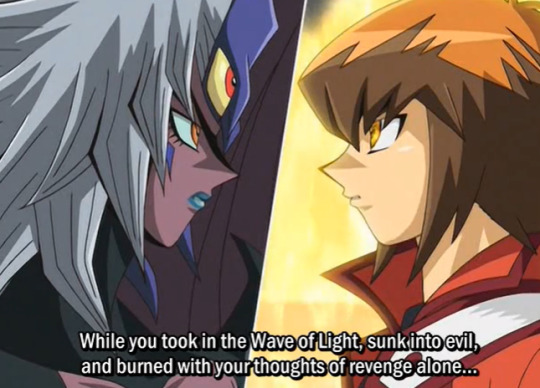
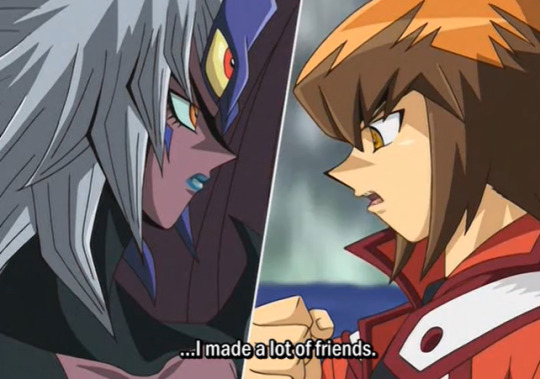
They started at the same point, but by the time they meet again they're completely unrecognizable to each other.
As easy as it is to see them as villain and victim you can flip their roles too. As Judai is responsible for the chain of events that led to Yubel's torture, from Yubel's point of view they are the victim and Judai the villain.
It's unfair to hold a decsion they made when they were five against him. However, abandoning Yubel is a choice Judai continually makes, even after learning Yubel's undergone ten years of torture they were responsible for.
Judai: Yubel didn't come into being by coincidence. I made them who they are.
Judai continually ignores Yubel to search for Johan. However, he's not responsible for Johan. Johan made the choice to sacrifice himself. Wanting to save Johan isn't bad of course, but wanting Johan back is about what Johan represents to Judai not who he is as a person.
Yubel rightfully points out Judai will go so far to save Johan, but won't lift a finger to help them.
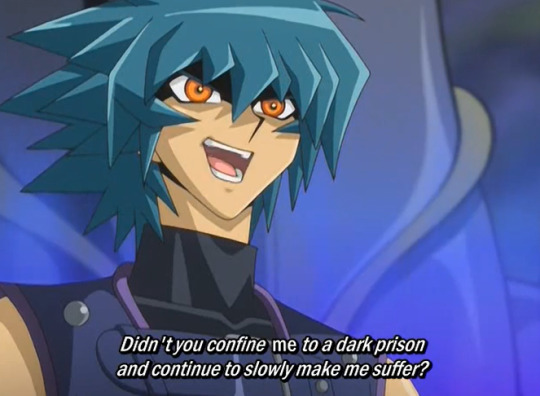
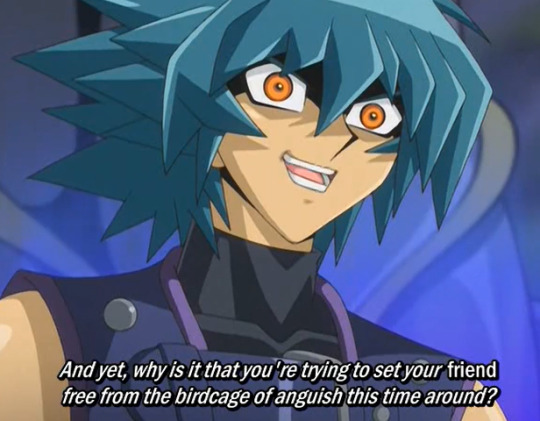
In fact Judai's obsession with Johan, is a narrative flaw (one Yubel reflects for the audience). It leads to his destruction.
Sho even calls him out, his willingness to sacrifice anyone, including his friends for Johan's sake. It's selfishness on his part. To quote this post:
The way he goes after both after Johan in season three and O’Brien shows that he actually doesn’t care all that much for them as people. To him, they represent a concept: Victory, or at the very least atonement for his past actions. A convenient way to right what he did wrong. That is not to say that he doesn’t like them as people - he does. But when the chips are down, what he ultimately wanted was a chance to redeem himself by saving them.
Yubel's obsessive pursuit of Judai to the destruction of everyone else, reflects Judai's obsessive pursuit of Johan destroying his friends.
To quote the above post again.
Yubel is a deeply selfish person as well. However, it’s a different kind of selfish. Yubel has exactly one priority: Juudai. Anyone or anything that isn’t Juudai doesn’t matter, and Yubel will go after Juudai no matter the situation and no matter the consequences.
They're both two deeply selfish people and Yubel is needed to cast a light of this selfish side of Judai. When the two of them are compared though the image blurs, Yubel doesn't have the right to take their pain out on Judai's friends, but Judai goes on to later do the same thing.
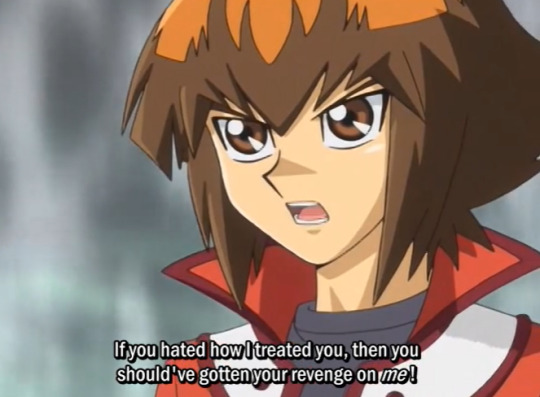
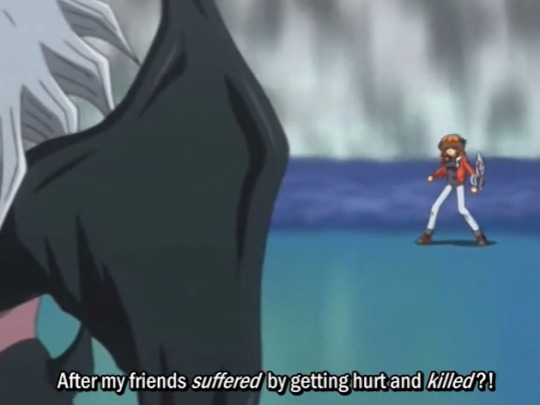
"But then that's the nature of love, isn't it? I wanted all that torment to convey the depth of my love."
Judai rightfully calls out Yubel's involvement of innocent people, but it's hypocrisy on his part. He doesn't have the moral high ground here. Yubel's suffering doesn't entitle them to take out said suffering on Judai's friends, but Judai also slaughtered innocents as the supreme king.
Judai framing Yubel's reaction as revenge is ignoring his own flaws and role in things. Sharing pain = understanding = empathy for Yubel. Yubel wants to be understood, but Judai wants to ignore his shadow.
Yubel's strategy is a kid of forced empathy - to drag Judai down to their level and make Judai understand the same pain so Judai will understand them.
I'm going to quote another post again, this post here.
In her desperation to grasp why she was being made to suffer if Judai loved her, it makes a certain amount of sense that she would latch on to the suffering itself as being something Judai wanted for her. (She knows and admits this isn’t true, btw, but it’s the only thing that allows her even a tenuous grip on sanity) Then, when she was in a position to meet him again, her own views on love would allow her to subconsciously justify making him suffer the same way because her pain had left their life experiences too disparate to form a meaningful connection once more. And the hilarious thing is that she was ultimately right? Yanking Judai down to her level is what allowed Judai to understand her in a way that was impossible before he had his own little fit of love-induced murder spree. I think what people sort of miss is that what Judai is reviling her and calling her an unfeeling monster near the beginning of their duel, he’s the one that’s wrong.
This symmetry they eventually reach where they both become perpetrators shows the biggest thing they share in common: trauma, and how they react to it.
Trauma comes to define both Judai and Yubel, but they react in different ways.
Yubel externalizes their trauma, the same trauma Judai hides internally. What Judai conceals, Yubel by acting out their grief on others reveals.
Yubel wears their heart on their sleeve for all intents and purposes. They will act out their pain on others, gleefully, sadistically so. Their entire philosophy of love revolves around the idea that intentionally inflicting pain as a show of love.
However, as stated above that's a coping mechanism. When Yubel says they want to share pain with Judai, it's not revenge, it's a desire for empathy and understanding. Yubel wraps themselves in a blanket of love, to endure years of torture they suffered alone.
Yubel can't just ask for Judai's love though, they demand it.
This too is Yubel shielding themselves, they're coping with their abandonment trauma. Yubel can endure any pain inflicted on them if they convince themselves that Judai still cares, they can crawl out of a crater if it might lead them back to Judai. If Judai rejects them however, they completely fall apart.
Judai too, is protecting himself from fears of abandonment.
Judai's coping method is opposite, he internalizes all his emotions. The pressure of having to constantly rescue his friends, his fears that he can't lose once, or else he'll lose everything. Judai hides it under a smile, and a fun loving attitude.
Judai even states point blank, the reason he always runs forward is because if he stops to think he won't be able to continue. Judai compartmentalizes everything, and it all starts to pile up so high that if he just can't process it.
Judai: I can’t just stay and wait. All this time I’ve run on instinct, never second-guessing myself. If I just stand still now… I’m sure I won’t be able to start running again. And I won’t be able to get to Johan.
Even Judai taking on his friend's burdens, is done out of a fear of being alone. In his backstory Yubel drove all his friends away and it doesn't seem like he made friends until he came to Duel Academia.
Yubel and Judai both spent a significant amount of time alone, and they both fear going back to that time.
When Judai takes on other's burdens, it's a way to protect himself. If he's constantly doing them favors, they have to stick around right? It's still a transactional relationship though, the same way Yubel thinks all of their love entitles them to Judai's love.
Judai's method is to internalize everything. That seems better than Yubel, because Judai's not hurting anybody right? Except Judai's owbmethod of coping turns out to be just as unhealthy as Yubel's.
Judai carries the weight of everyone on his shoulders until he can't.
Judai's fears of being abandoned become a reality.
It's telling that Judai's breaking point isn't Fubuki, Sho, Asuka and Manjoume's apparent deaths. He's deeply upset by it for sure, but what pushes him over the edge is Sho's rejection afterwards.
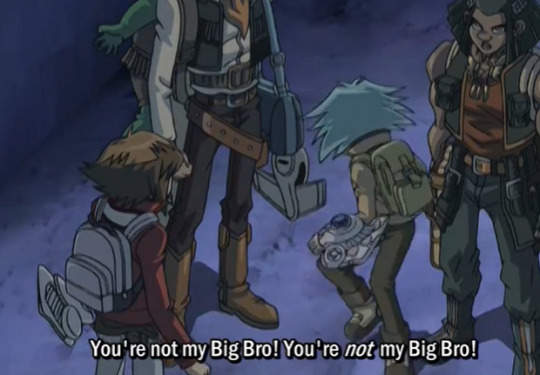
Judai's friends being taken away in circumstances out of his control is one thing, but the fact that Sho leaves him? That Sho sees the part of Judai's self that he's always been hiding and gives up on him. That rejection sends him spiraling, because all along Judai was driven by the same fear of rejection Yubel was.
When Judai reaches his breaking point, he externalizes all the trauma he held within. He starts sacrificing others for power, because he's convinced himself with his friends gone power is what he has left. Judai acts out that trauma on others, as Yubel does with Judai's friends.
In the end Yubel and Judai react the same way to being abandoned, they share the same flaws and the same fears.
Rejecting Yubel, villainizing them, despising them is an act of self-loathing for Judai. However, empathizing with them, understanding, trying to reach out a had to break the painful cycle between them - is Judai accepting himself.
Chemical Wedding
Judai and Yubel become their worst selves when they are alone, they walk parallel journeys in season 3 dragging down Judai to Yubel's level until at last they finally reunite.
This metaphorical union is a chemical wedding, of two opposites coming together. How Judai and Yubel's relationship changes throughout the narrative is vital to how they develop. Their bond develops each of their characters, until they integrate qualities of each other.
The final stage is called a wedding, it's not necessarily romantic but Yubel's 10,000 love confessions can certainly be interpreted that way.
Once again it's not really about what's healthy in a real life relatioship, it's a symbolic journey two characters take in a story. Yu-Gi-Oh Gx uses chemical weddings to develop the romantic relationship between Judai and Yubel.
(What about Bruno - I'll talk about him later next post. Please be patient, I can't cover everything in one post).
Here's another meta on the concept of chemical wedding's in general for a different show. The chemical wedding between Judai and Yubel is woven into the text in may ways.
The show is rife with direct references to alchemical imagery (references to medieval portraits, the solar king and the lunar queen)
A process of death ad rebirth they both undergo multiple times, until their last union where Judai says he might be destroyed by the attempt to fuse with super-poly but he doesn't mind).
The four elements are referenced in the clash between Judai and Yubel, Judai is fire and air - their favorite monster is flame wingman an air and fire hero combined. Yubel is water and earth, their entire deck has a plant motif).
The two of them literally fuse together into someone new. That act is what purifies Yubel's soul by uniting it with Judai, the process of alchemy is purifying metals until they forge gold.
Yubel is also literally a hermaphrodite, and by incorporating Yubel into themselves the two of them together become a hermaphroditic figure.
So that’s the role and importance of the chemical wedding. Pretty vague, right? But over the centuries the most common imagery has been a man and woman--often King Sol/Sulphur and Queen Luna/Mercury--1. standing together, 2. conjoined, or 3. combined into a hermaphroditic figure. -In the Dictionary of Alchemical Imagery, Lyndy Abraham definition of chemical wedding.
The basic formula of a chemical wedding is the union of opposites (Fire and water, air ad earth, sun and moon, light and dark), that union creating a "Rebis", a figure that is both male and female. Judai and Yubel's journey takes them on a path to uniting as one.
It's a violent sometimes dangerous process as in each step dissolve et coagula occurs, in order to forge your better self you have to let your old self dissolved, which is sometimes a violent even painful process.
It's why Chemical Weddings often take the form of violent conflict. A conflict that threatens to destroy both parties.
The first chemical wedding is usually somewhat violent, primitive even, whereas the second one signifies the creation of the stone. However, characters can have more than two weddings (Hamliet).
Yubel and Judai have three violent confrontations in Season 3, before their final union of opposites take place. The three weddings are the three steps in their journey. It's also a process where both experience several metaphorical deaths, before finally their two souls unite into something new (which is why the ship is called Soulshipping).
SOULSHIPPING WEDDINGS - STAGE ONE
Alchemy is a process of continual death and rebirth. Yubel and Judai both go through two symbolic deaths, (the second one they die together to reforge themselves into something new).
Yubel's first death takes place sometime during season 1 and 2. The satellite containing them finally crashes back to earth, and Yubel burns up upon re-entry. Putrefecation, or Nigredo is the first stage of alchemy a process of boiling away all impurities, and it's associated with the element of fire, and associated with the color black. Yubel's spirit form of a black dragon comes out to protect them, and that burns away too. Nigredo is often signified with the death of a dragon.
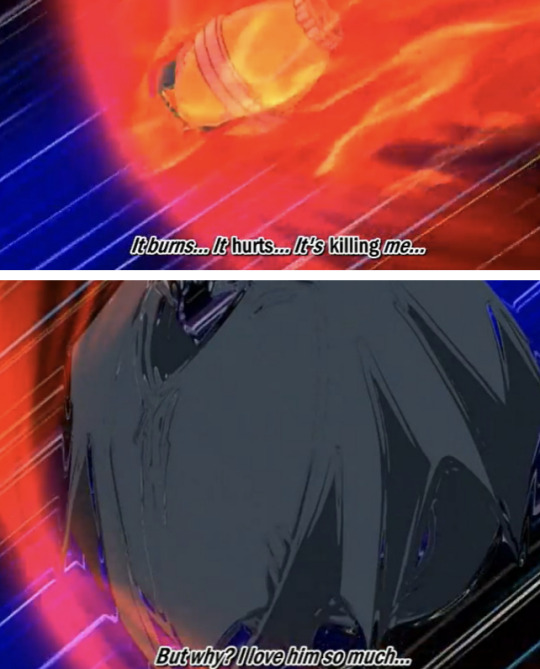
Yubel comes close to death, but their true death is metaphorical.
What Yubel truly experiences is the death of their old self, as the trauma they've endured makes someone new crawl out of the wreckage.
This is the moment onscreen where Yubel snaps and adopts their new philosophy of love, that love is sharing pain with someone else.
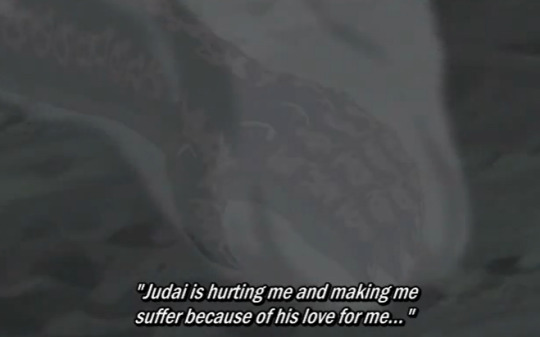
Yubel literally crawls out of earth, out of a crater that could have easily been the sight of their grave. However, their rebirth comes when Yubel reconstitutes themselves in time to meet Judai face to face a second time.
Yubel's true form is revealed then to be that of a rebis.
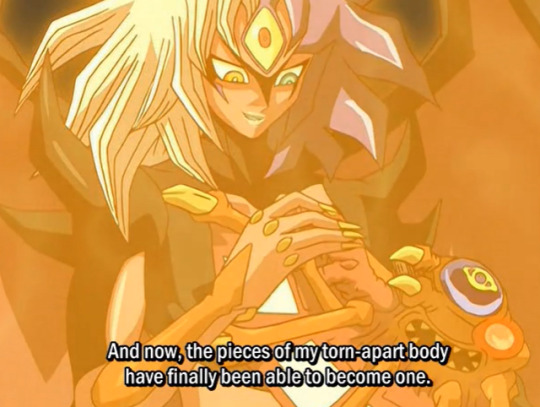
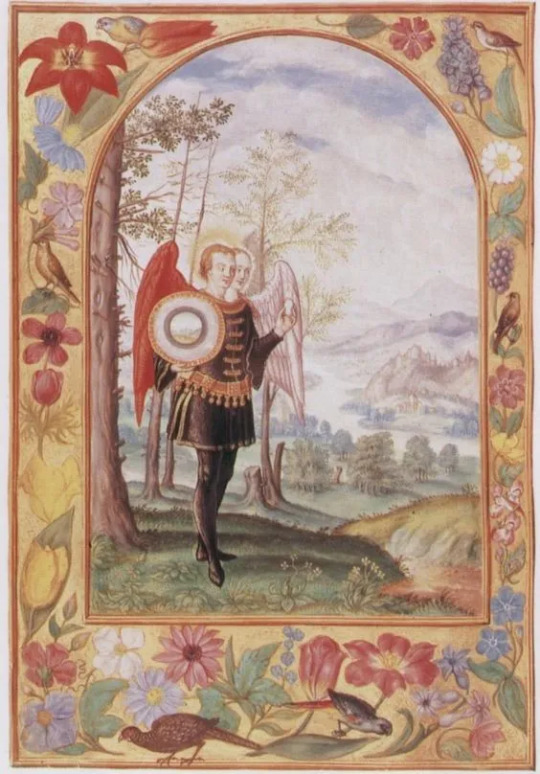
The head on the left is male, the wing attached to his side is red. The head on the right side is female; the wing attached to her side is white and in her hand she holds an egg. This figure is known as the Hermaphrodite, half man and half woman.
Yubel's design is a Rebis, split male and female down the middle. It's even implied in their backstory they were more masculine, and through an alchemical process to become a dragon altered their body to look as such, giving them several feminine traits.
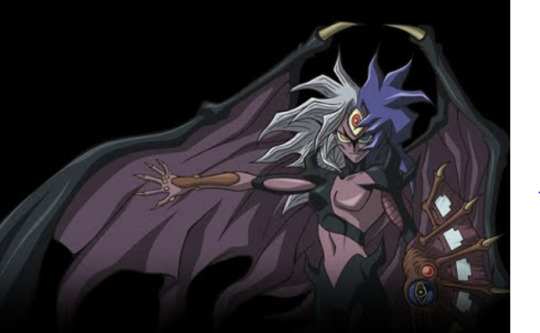
Yubel as one boob and one pec, speaks in two voices a deep masculine one and a light feminine one, defaults to using masculine "ore", but plays a feminine role to comparison Judai's more straighforward masculinity, they even have their face split one side being drawn with eyelashes. The image above is the hermaphrodite and the dragon, Yubel is both.
Yubel can be a reference to the greek story of the hermaphodite or the concept of the Hindu god "Ardanareshwara" which translates to "Lord wo is half woman." Likely both, they have a third eye on their forehead in the place of a bindi in traditional depictions of that god.
Ardanareshwara is the embodiment of the union of male and female energies in the universe, as well as the sacredness of marriage and copulation. [Mythcrafts]
The Splender Solis pictured above are images from the ripley scroll, a in alchemy text. There are 22 plates total, but plates 5-11 are called the parallels they reference the process of death and rebirth.
The seven parables are:
Plate 5 - Miners excavating a hill
Plate 6 - Philosophers beside a tree
Plate 7 - The drowning king
Plate 8 - Resurrection out of the swamp
Plate 9 - Hermaphrodite with an egg
Plate 10 - Severing the head of the king
Plate 11 - The bath
Season 3 goes through all seven, quickly covering the first two plate 5 is mining the Rainbow Dragon out of the side of a mountain, Philosophers beside a tree is Johan's deck using crystal tree, and also Judai awakens after Austin snaps him from his Haou phase underneath a tree.
Judai and Yubel's parallel journeyes reference plates 7-11, #9 was already pictured above.) They both experience two deaths, two rebirths, before their final third union.
Yubel's second death occurs here, at the hands of another dragon (Rainbow dragon is involved).
The first chemical wedding is usually somewhat violent, as metals need to be melted down and reforged through multiple steps in order to create a purer metal.
Judai definitely doesn't want to unite with Yubel their first encounter, they're at each other's throats, in fact Yubel specifically states they want violence, to share as much pain with Judai as possible.
Yubel ends the first wedding literally dissolving gain right in front of Judai's eyes, only to reforge themselves with Johan's body.
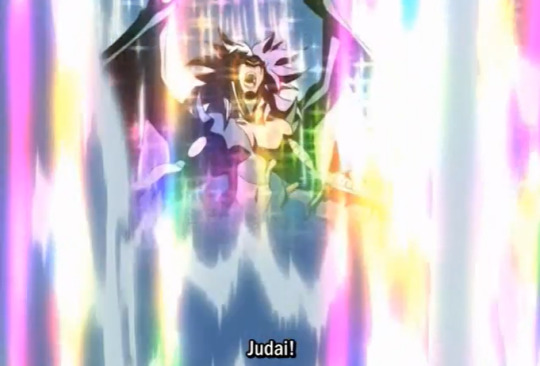
Those are Yubel's two deaths, and Judai's two deaths happen in parallel.
SOULSHIPPING WEDDINGS - STAGE TWO
Yubel is the process of two people breaking down, and mixing until they acquire each other's traits. Yubel pushing Judai down the path of becoming the supreme king, so they can be reunited again is exactly that.
Yubel's plan is to force drag Judai down to their level, so they can be reunited, and at that point Judai having walked a similar path and taken on traits of their can understand them, they tell Judai as much.
So when I solved the riddle you posed I was delighted. ANd that fueled my decision. I would try to fill the entire twelve-dimmension universe with my love towards you, Judai. And once I did, you would have to recognize my loev wouldn't you? That's why I sought to fill all those linked to you, your world, with sadness and anguish. And my line of thinking wasn't wrong!
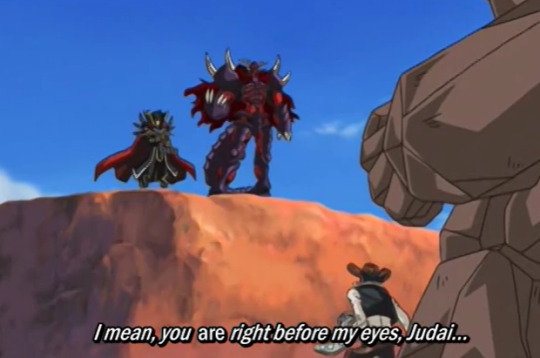
Judai has to go through a process of two deaths mirroring Yubel's own before he can reunite with them in their second wedding. Yubel even says, the first time they dueled didn't work out, because Judai hadn't awakened his darkness of the heart yet. Judai needed to take on Yubel's traits.
Judai's journey to Yubel is referenced by two Splender Solaris plates.
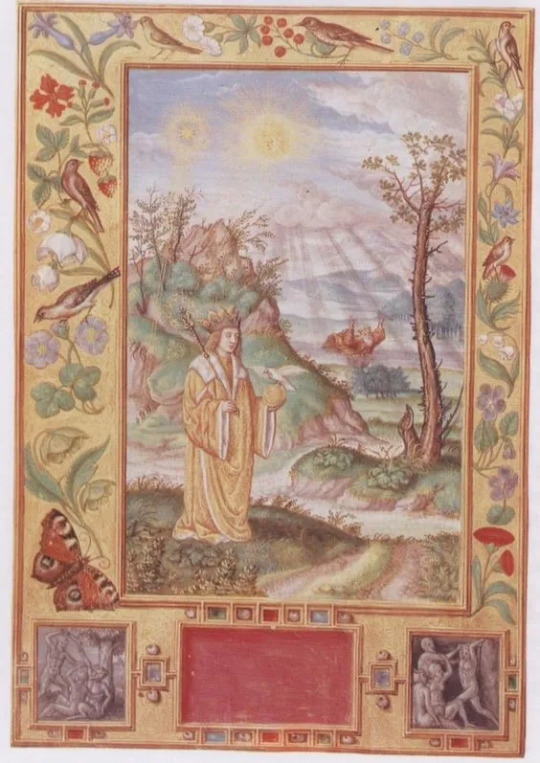
"The destruction of one thing is the birth of another " - Aristotle.
The plate depicts an old king drowning, and a new king being reborn at the same time.
The text describes to us how the old king was taken under, but then reborn the next day from the earth as the new king; the old king must die before the new king is born.
Judai's first death is his breakdown after Sho's rejection, he quite literally experiences a death or self, while at the same time rising up as the supreme king - but it's not a split personality or anything like that, merely an inversion. Judai once internalized their pain, now they externalize like Yubel. Yubel in acquiring darkness of the heart, Judai then begins to take on Yubel's traits, integrating facets of Yubel into themselves.
Within the stages of physical alchemy there is a set referred to as the drowning king; this is the dissolution step of the Nigredo process. This is when the alchemists would take their chemically calcified ashes and dissolve them into water.
Judai experiences the same Nigredo that Yubel does, as his old self dissolves away. Judai sinks into a mental landscape which is pictured as all black, while a new Judai the supreme king assumes his form out of the shadows. The new king has golden eyes, like the new king in the painting is dressed in gold.
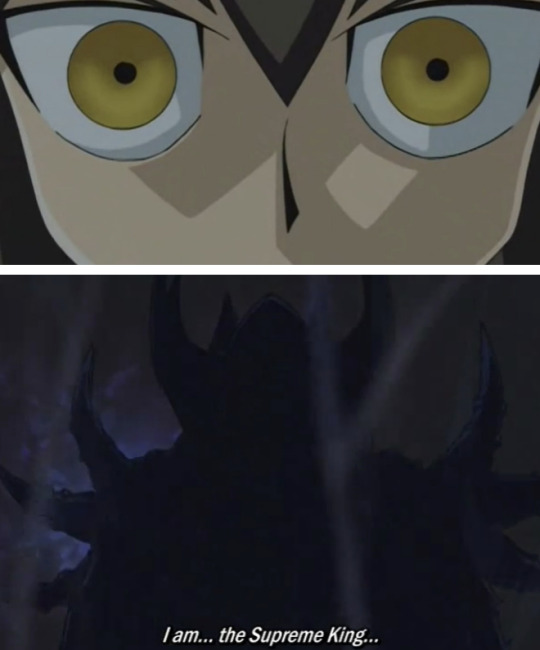
This is where Judai begins taking on parts of Yubel, not only do they lash out at innocent people as Yubel does, don a plate of armor to protect themselves (Judai has black armor, Yubel has impenetrable scales).
It's also a direct parallel to Yubel's experiences. Judai is left alone by the friends who he thought would always take his side and sinks into darkness. Yubel spends years alone in what they call "a capsule of darkness" in space after Judai's abandonment, sinking into denial because Judai couldn't possibly treat them this way when they love them so much.
Judai dies and is replaced by the supreme king, but the supreme king is a just a temporary stage in his development.
In order for Judai to heal he needs to be dismembered first, the Supreme King's head is torn off in a reference to Splendor Solis: Plate 10, severing of the head of the king.
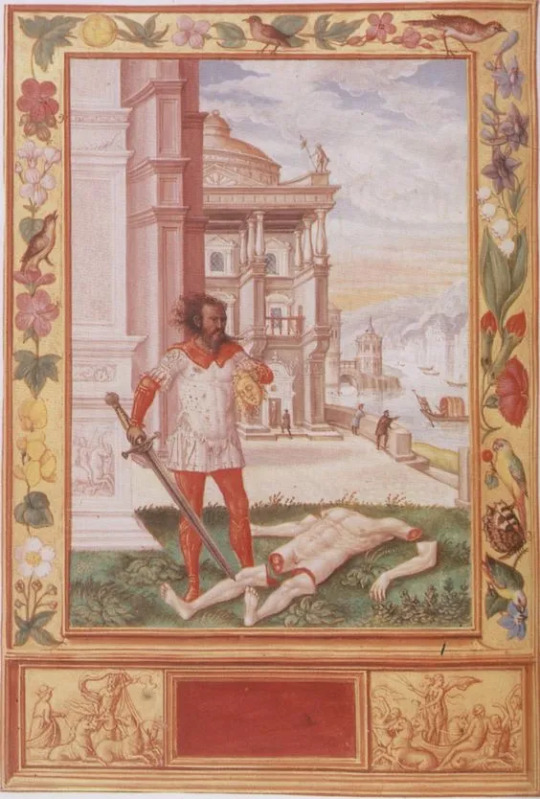
Alchemy is violent; the motto of Solve Et Coagula demands dissolution before rebuilding, tearing apart before putting back together. This idea applies to the material world as well as the spiritual realm; before the psyche can grow, it has to be ripped asunder.
The Supreme King is eventually stopped by Austin, they burn away in in fire, against a duelist with a flame deck, reduced to ash only to rise from the ash reborn like Yubel did out of the crater.
After the end of the duel, Judai's helmet is removed and thrown for all to see to signify the king's dismemberment.
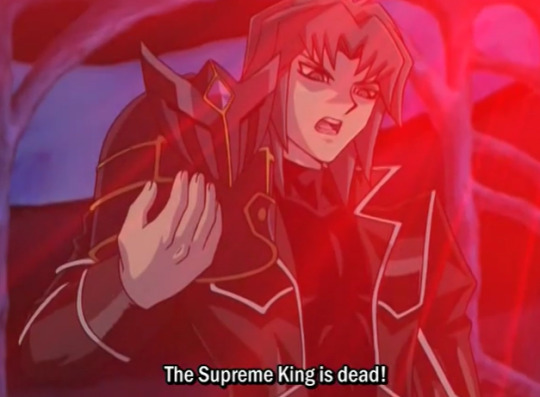
Judai now struggles to become someone new, as he cannot return to his previous state of innocence, but can't keep continuing on as the Supreme King. When Yubel and Judai reunite again Judai has taken on so many of Yubel's traits, they are mirror images of one another.
The second stage of alchemy is albedo, the word is taken from ablutio - the washing away of impurities. When Yubel and Judai meet for a second time, Judai's only priority is to cleanse Johan of Yubel's body, literally through purifying Rainbow Dragon in order to return Johan to his body.
His action in the duel is to destroy the "advanced darkness" field spell which changes Johan's crystal beasts, into darkness crystal beasts. First Nigredo, then Albedo, the prima materia is boiled in a flask where all impurities rise to the surface and make a thick black material, and then those impurities are washed away.
Cleansing Johan's soul doesn't go as intended for Judai however, because the only result is that Yubel reconstitutes themselves for a second time and faces Judai again in their true body.
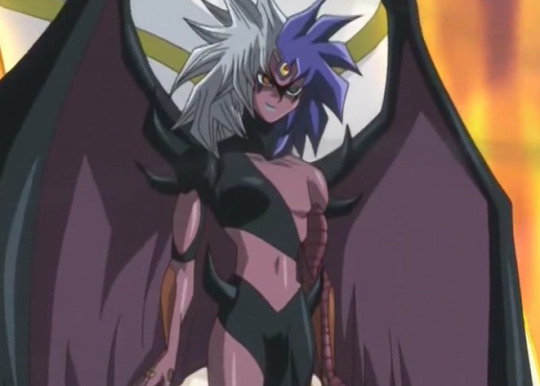
The cleansing turns from Rainbow Dragon from Black to White and both Yubel and Johan are purified into their true selves.At this point they've both experienced multiple deaths, they've both been torn apart and sewn back together again. However, they still have one stage to go.
The duel ends in a draw and they restart another duel facing each other this time, thus beginning the third and final wedding.
SOULSHIPPING WEDDINGS - STAGE THREE
The final wedding in a chemical wedding forges a philosopher's stone, and I bet you can't guess how this third wedding ends.
Everything so far has made use of the death and rebith imagery. Yubel and Judai grow closer each other through a violent union of opposites (extremely violent in this case ). They experience two metaphorical deaths as a part of their journey to finding each other.
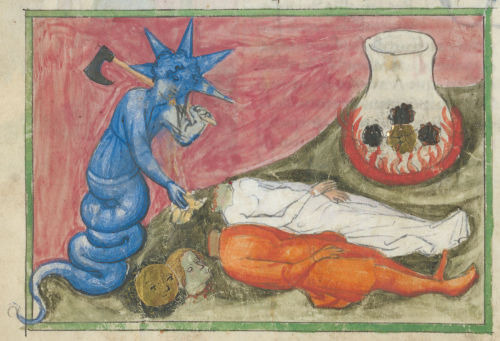
Death and Rebith is a major theme in the last duel, before they both experience their final death together, to become a new being together.
As I said above they've experienced several violent deaths, Yubel is ripped to pieces until they're nothing more than an arm, Judai experiences an ego death and reforms as the supreme king, before the supreme king's armor is torn off him.
In the third duel Yubel's signature monster experiences two deaths, only to be reborn again into stronger forms, yubel terror incarnate, and yubel the ultimate nightmare.
Yubel starts as a one headed dragon, their second form has two heads, their third they fuse with the dragon becoming the third head representing the three stages of alchemy. In the picture above the red, white and blue signify those three stages as well.
Judai and Yubel are also positioned as the Solar King, and Lunar Queen in their duel, just as in the alchemy painting above.
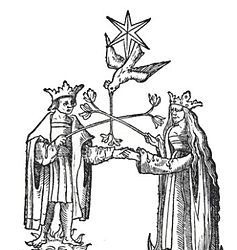
The above image image is taken from is called Rosarium Philosophorum–which literally means “rose garden philosophy. In this case I believe the anime writers are deliberately reference the "rose garden philosophy" name b/c even Yusei and Aki in 5Ds have a similar duel in a Rose Garden that parallels this duel - representing their union of opposites too.
The final duel between Judai and Yubel takes place in a rose garden, intentionally so. Yubel uses two rose themed cards, and their method of attacking and sharing pain nightmare pain revolves around lashing out with a vine covered in rose thorns.
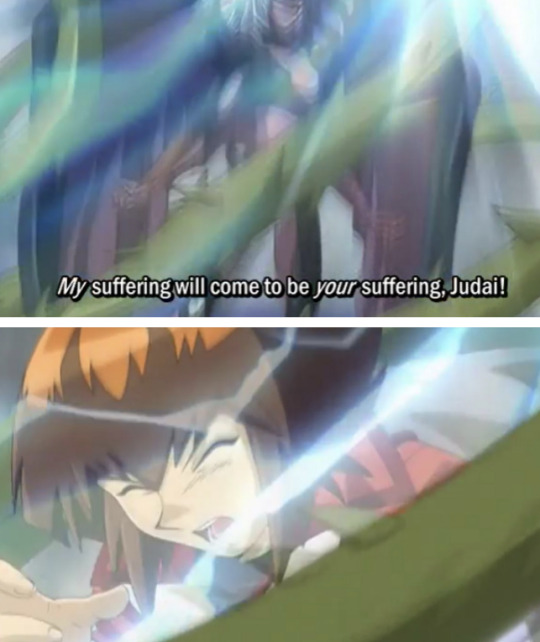
They're both entangled in the rose garden together, as Yubel says my suffering will become your suffering, Judai. Yubel isn't immune to pain they suffer alongside him, for Judai hurtng Yubel is an act of hurting himself. That's also a reference to the ouroboros, the snake biting it's own tail is a common symbol associated with initiating the alchemical process.
Judai has taken so many traits of Yubel at this point they are inseparably intertwined, there's no telling where Judai ends and Yubel begins so any damage Judai attempts to do is dealt to himself as well.
Standing together in the garden Judai assumes the role of the solar king, and Yubel the lunar queen.
Yubel's machinations were to make Judai ascend into a king, Judai is referred to as being like the sun by Sho drawing everyone in.
Bro... Bro, you're too selfish. Before now, I thought of you as the sun. Someone who gave others energy and made the impossible, possible.
Yubel is the moon which orbits around Judai. There's the time they spent in a literal satellite, floating in space among the stars to signify this. Yubel even drops a reference to the myth of Endymion. A story where Selene, the titan of the moon fell in love with a young boy and asked for them to fall asleep and stay young in their sleep forever so they could gave upon them lovingly as they slept.
I will take you to a distant dimmension, where no one will ever reach you. There I will watch over you as you sleep forever.
Once again Judai is fire, and Yubel is mainly plant themed. Judai assumes a masculine role, Yubel after transforming into a Rebis changed their body to take on feminine traits. Judai is the holder of the gentle darkness, Yubel is corrupted by the light of destruction which is engaged in a battle with the gentle darkness.
Theirs is a violent union of opposites, they are literally trying their best to kill each other.
Yubel frames themself as the selfless protector of Judai like a knight or servant, but their obvious desire is to stand together with Judai and be on the same level with him (hence dragging him down).
They spend a duel against Amon reviling him for how easy Amon could throw Echo away, because ultimately Amon is the king, and therefore Echo is beneath him. In fact Yubel was content to just sacrifice their body like Echo and serve as a protector in a previous life, until prince Judai offered Yubel their eternal love, giving something in return and elevating to them as equals.
So Yubel's primary goal is to be by his side, to be lunar queen to his solar king.
In order to accomplish this the art depicted above has to happen, they both have to dissolve, experience a death and become something new together.
Judai even explicitly tries very hard to kill Yubel, saying they'll use the power of the supreme king to erase them from the universe. Yubel similarly, rejected one too many times responds to violence with violence. Their union is inherently marked by violence. However, it's what brings them to a closer understanding of each other.
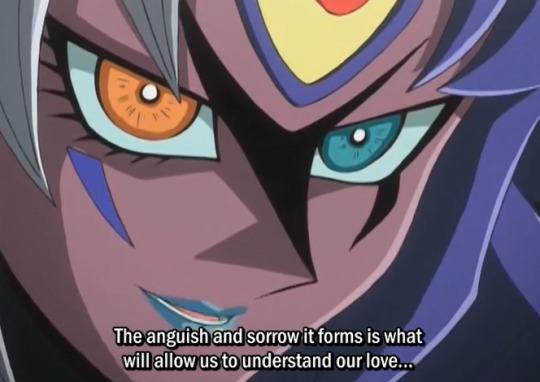
However, while violence brings them closer together, it eventually has to transform into a a union.
As they reach the final stages of the duel, Yubel states to Judai they finally understand that Judai has chosen to respond to all of their love with hate (once again union of opposites, love and hate). At the same time a wind begins to blow, elemental symbolism occurs as the wind and clouds appear in a process of "sublimation", and Judai's past is revealed to him, and he realizes his memory of his past life of the Supreme King.
Sublimate appears as a term for a mineral deposit, by analogy to the alchemical process: minerals in a vapor state, thrown up from the interior of the earth.
The introductory of the element of air also signifies Yubel and Judai moving from Citrinatis, the yellowing, signified by earth to Rubedo the final stage where the philosopher's stone is forged. Judai and Yubel's first duel takes place in a desert (earth), their second they climb high into the sky, and their third they climb even higher until they are standing above the clouds fighting in an arena of air.
Sublimation is a whole new experience of self and reality, both being redefined. Judai's reconciliation isn't just Yubel, it's with the three faces of himself Prince Judai, Regular Judai, and Haou / Supreme King. These memories lead to Judai's eventual decision, to propose a union. This union takes place as the last chemical wedding, which is also a real wedding in everything but name.
Their entire duel contains elements from both japanese and jewish weddings (the three phantasms that Yubel utilizes in the duel against amon are based off of three kabbalistic angels so the jewish symbolism has already been used before).
A traditional Jewish wedding starts with drawing up a marriage contract (Spell Chronicle), and the bride paying out a dowry (the five cards Yubel banishes at the start of the duel). The wedding must be observed by a minimum of two witnesses (Shou and Ojama Yellow). During the wedding the bride circles the groom seven times (Yubel makes 7 successful attacks on Judai between their 3 forms, all others were negated in some way). At the end of the ceremony, the groom presents the bride with a ring (Judai giving Yubel Super Fusion), and a glass is broken to the cry of “Mazel tov!” (the glass window breaking in Samejima’s office). Finally the ceremony isn’t considered complete until the bride and groom retire away from everyone to ... consumate the marriage (Judai and Yubel leaving together). Source [HERE]
Judai attempts to use super polymerization card to start the process of alchemy (fusing the 12 dimmensions - there are 12 steps to Alchemy). However, Judai announces that the two of them are going to fuse together.
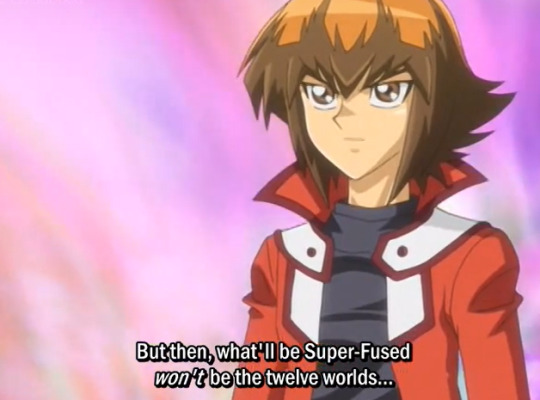
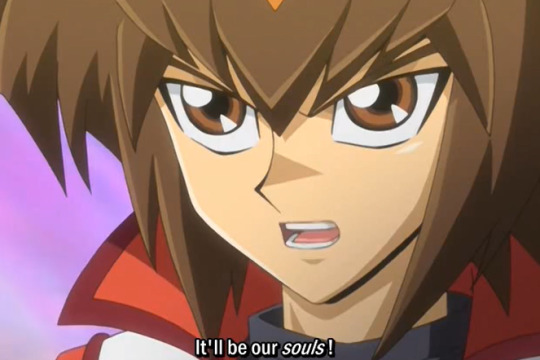
Judai and Yubel's quite literal fusion into one being is the formation of a hermaphrodite. From the essay of "Get your Gender On, Jaden Yuki and Yubel",
Art historian Arturo Schwarz argues that “the Great Work is but a metaphor” in which alchemists don’t create a Rebis but become a metaphorical Rebis themselves, as Judai does over the course of the series. By joining his soul with Yubel’s through “Super Polymerization,” he arguably becomes nonbinary like them. Even before literally fusing with Yubel, he gains “aurea apprehensio (golden awareness) of this marvelous reality: we are gods, because we all are man and woman at one and the same time.”
Hermaphordadites are a recurring symbol in a lot of greek mythology, the name comes from Hermaprhoditus a son of Hermes and aprhodite originally born male. A female nymph fell in love swam to him in a pool and wound herself tightly around his body and begged the gods to never tear them apart creating the co-joined male and female figure the hermaphrodite. The parallels to Yubel and Judai are present, especially in them becoming entangled in one another.
One origin story for humanity is also that human beings were originally two headed, four armed, and four legged beings, combination of men and women, men and men, and women and women. However, they were torn apart into two seperate beings, and forever doomed to go searching and be reunited with their second half.
When opposites are finally reconciled, the great hermaphrodite is formed. Judai even refers to this as an act of finally purifying the light's corruption from Yubel's soul by uniting it with the supreme king's soul. The union is a purifying process, and the end of Yubel and Judai's long journey of losing each other and finding each other again.
However, in order to be purified they have to both let their old selves die in order to form something new, the final death but one they experience together. Just like the painting of the dismemberment of the solar king and lunar queen, they need to be torn apart and sewn back together again.
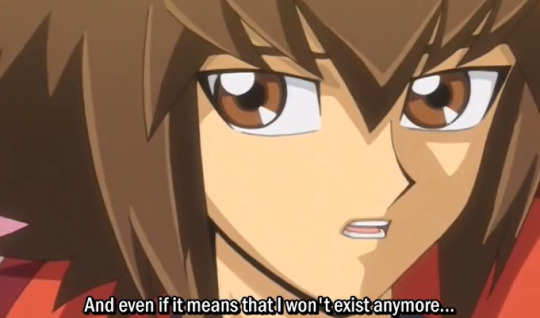
I don't care.
Yubel is finally moved, and all the anger between them is washed away by tears as they're finally allowed to grieve (as death is central to alchemy, so is grief, both are parts of life).
To signify the end of this journey, Judai falls to earth the same way Yubel did at the start of their story. However, while Yubel was suffering, all alone, this time Judai and Yubel are together.
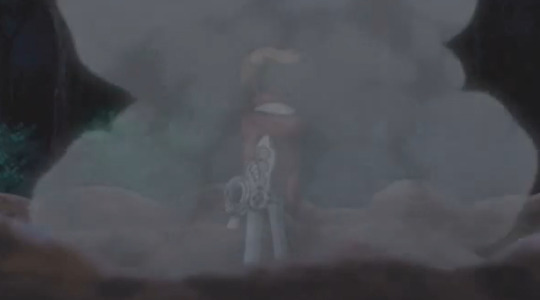
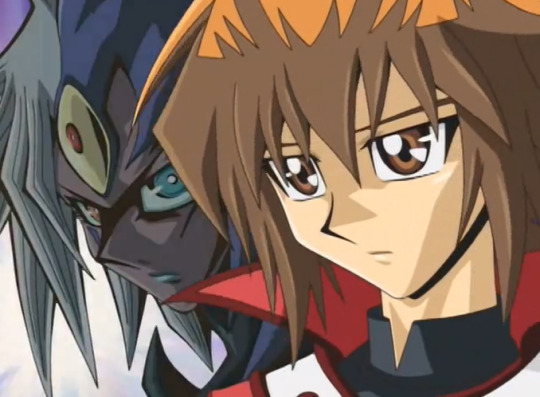
#yu gi oh gx#yu-gi-oh gx#judai yuki#yubel#soulshipping#yu gi oh gx meta#ygx meta#alchemy#jaden yuki#ygo meta
124 notes
·
View notes
Text
something i massively respect about alchemy stars' writing in regards to illumina is that it would be So SO easy for them to fall into a "military is good/bootlicking is necessary" trap considering they arent fighting other people but literal nightmare monsters, many popular characters including the main heroine of the game are from that military faction and our protag multiple times works with and depends on them, but INSTEAD it's even more critical of militarized structure and armed forces as a concept because of it.
rather than just going "our soldiers are brave for fighting monsters" they go "actually in such a brutal struggle it becomes frighteningly easy to throw out morals in the name of survival, meaning that we can mold people into living weapons all for the sake of said survival" and "so long as the greater humanity survives the powers that be have no issue tossing out as many lives as it takes while they continue to push propaganda of heroism as grand to continue adding more bodies to the front line" and ALL OF THIS IS RIGHTFULLY PRESENTED AS BAD EVEN WHEN SAID ENEMIES ARE NOT OTHER PEOPLE BUT LITERAL NIGHTMARE MONSTERS. even in reinhardt and bartons backstories where we see their rise to glory as some of the biggest players in illumina they are constantly criticizing the system they've been put into and choose to break said rules if it mean saving more lives. and what really makes alchemy stars' war narrative so compelling is that even some of the old guard soldiers in command who constantly argue with them all once held the same kind of hope they did and do, they're just so embittered and numb to watching so many people die that they Had to become cold and calculating about lives on the battlefield in order to ensure the greater survival of aurorians. and in current canon we have reinhardt flat out say that she hates how she understands her old commanders, that shes become the same type of person she once criticized because like them shes had to make unfair decisions that cost people their lives. but EVEN with all that, the actions of the committee and the war crimes perpetuated by them in the name of survival are still fully framed as being wrong.
it could have been so easy to just handwave this war aspect of alchemy stars' plot but they actually explore it in a surprisingly nuanced way i fucking love it
66 notes
·
View notes
Text
Ruby and the Splendor Solis
Here comes a quick alchemy meta! Alchemy is an ancient practice, whose goal is to create the philosopher stone. This stone gives immortality, transmutes lead into gold and creates new life (homunculus). From a philosophical point of view, alchemy's aim is to nurture the spirit and to make it perfect.
As @hamliet has explained in several metas, RWBY is an alchemical story, which metaphorically illustrates the procedure to create the stone (RWBY/Ruby).
Today's post will explore Ruby and Maria's interaction in volume 6 episode 8 (Dead End):

As a matter of fact the scene references the 6th plate of the Splendor Solis.
WHAT IS THE SPLENDOR SOLIS?
The Splendor Solis is an alchemical text, which describes how to make the philosophical stone through 22 illustrated plates:
4 introductory plates present the protagonists of the alchemical journey
7 parables illustrate the alchemical death and rebirth
7 flask plates explore the alchemical process from a practical point of view
4 final plates describe the alchemical process from a spiritual point of view
How does Ruby and Maria's scene reference plate 6?
PLATE 6 AND VOLUME 6
Let's begin with describing what plate 6 is like:
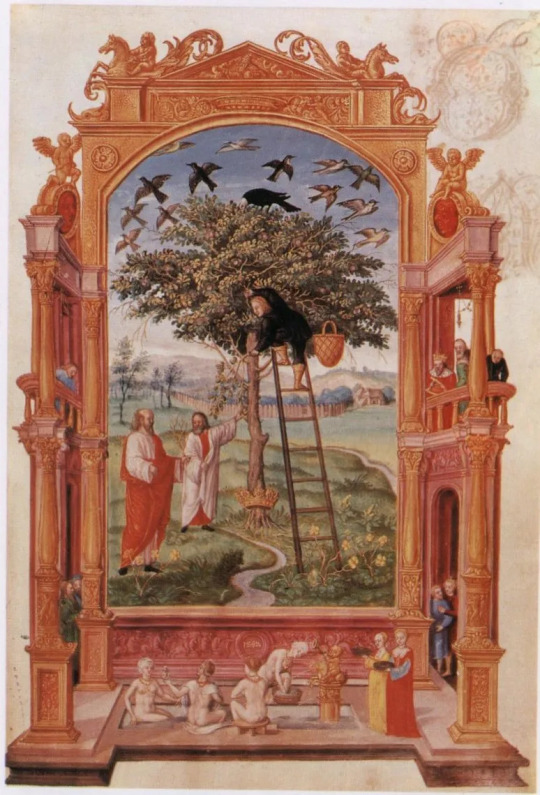
This plate has three philosophers under a tree with golden fruits. The tree is a metaphor for the alchemical process as whole. It is the philosophical tree and if you climb it you reach the golden fruit (perfection/the philosopher stone).
The three people embody the phases of alchemy:
The young man climbing the ladder is nigredo (black)
The man who wears white outside and red inside is albedo (white)
The man who wears red outside and white inside is rubedo (red)
Citrinitas (the yellow stage) is instead symbolized by the yellow flowers and by the golden bough the men are pursuing. The scene as a whole represents a transformation, which is why the birds that fly in the sky have some green shades. Green is, thus, the color of transformation.
How does all of this rely to Ruby and Maria?
First of all, the two silver eyed warriors speak under a tree:
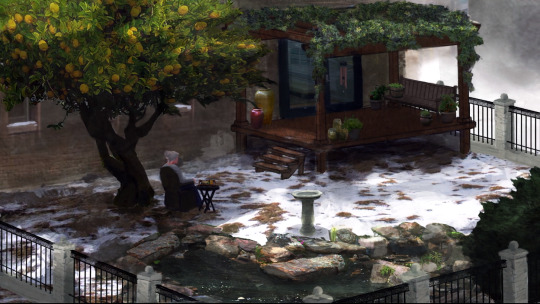
With golden fruits:
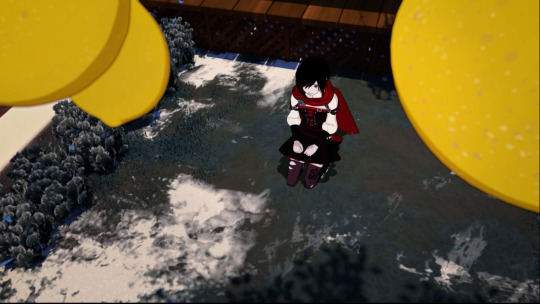
Secondly, this scene frames Maria as the teacher and Ruby as the student. Maria is initiating Ruby to very important knowledge, so that our young alchemist can continue her journey.
Ruby: I don't know… I don't know anything… What do I tell Jaune and his team when we don't even have a plan? Qrow's out drinking, Ozpin hasn't come back and even if he did, I don't know if I could trust him. And there's always Jinn, but… we only have one more question we can ask her. I feel like I'm letting everyone down… Maria: If you're tired of not knowing anything, how about we discuss those eyes of yours?
MARIA, THE TEACHER
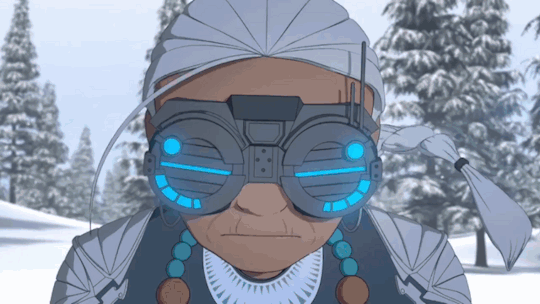
Maria embodies the archetype of the old wise woman. She is a mature version of Ruby (an older silver-eyed warrior), who comes in our protagonist's life to offer guidance. She is the more expert alchemist:

Maria grabs the golden fruit. Symbolically, this shows that she is far ahead of Ruby in the alchemical quest.
This is made clear by her:
semblance
weapon
Preflexes lets Maria sense everything better than others. Metaphorically, it means she has a better understanding of reality than others. This ties with her having wisdom.
Life and Death is made by two kamas that can be combined in a staff:
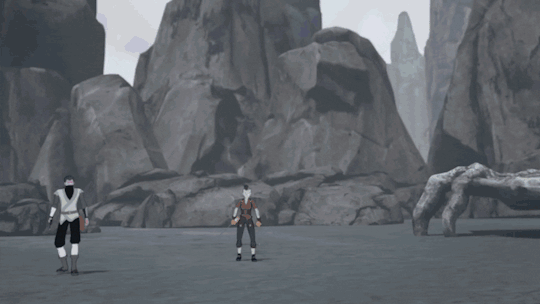
They can be separated (solvet) and united (coagula). Solvet and coagula is the mantra of alchemy, as this process aims to create the philosophical stone by separating and uniting the elements. Over and over. Until perfection is obtained. Metaphorically, it means a soul is refined through creation and destruction. Life and Death.
RUBY, THE STUDENT
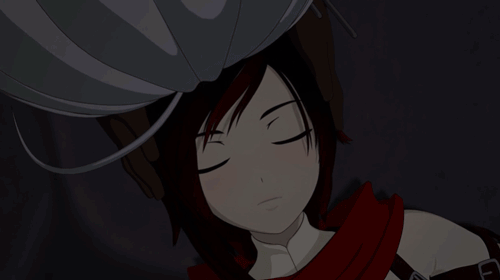
Ruby is young and ignorant. She doesn't know what to do and she doesn't know about her eyes. She is the alchemist apprentice, who is going through a transformation:
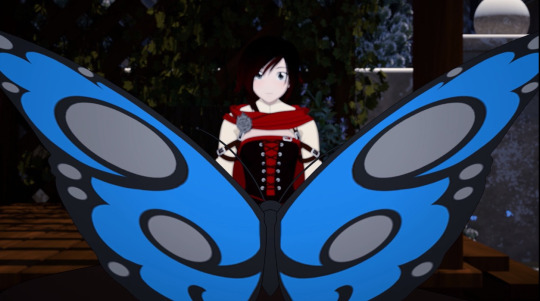
Differently from the Splendor Solis plate, there are no birds in the scene. However, the scenery is full of butterflies, which are another symbol of change. Of death and rebirth:

As far as the nature of Ruby's transformation is concerned, the setting gives us some hints, as Maria and Ruby are speaking in a garden full of white snow. That is because RWBY is approaching albedo (the white phase). In particular, volume 6 climax marks Ruby's passage from nigredo to albedo. This process if metaphorically foreshadowed in Ruby and Maria's conversation thanks to a specific visual cue:

Let's look at Maria's plate:
The grapes are purple/black = nigredo, the black phase
The plate is white = albedo, the white phase
The lemons/oranges are yellow = citrinitas, the yellow phase
The strawberries are red = rubedo, the red phase
The kiwis are green = transformation (plus prima materia, aka the beginning)
In short, the plate and fruits are a metaphor for the alchemical process as a whole. What's interesting is that a little butterfly flies on them:

It pauses for a little while on top of the grapes (nigredo) until Maria gently takes it and has it fly forward (towards albedo). The meaning is clear. Maria acts a mentor, who helps Ruby leave the black phase and enter the white one. She gives Ruby the knowledge she needs to face her "trial of fire":
Maria: The light will only work in the presence of Grimm. Meaning the only practice you'll get will be a trial by fire.
TRIALS BY FIRE
Ruby faces her trial by fire in the climax of volume 6, as she fights the Leviathan:
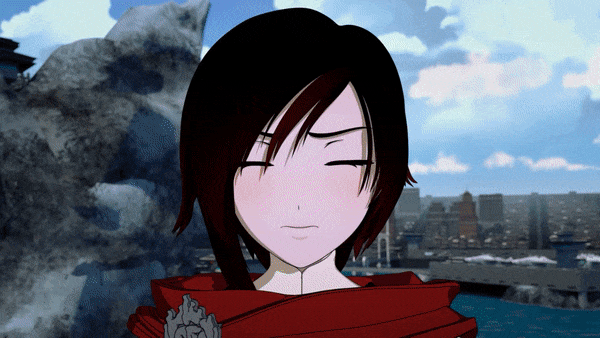
There she uses Maria's teaching and the relic of Knowledge to defeat her foe through her internal light. This moment is when Ruby and the group leave Mistral and the Black Phase once and for all. They are ready to face Atlas and the White Phase.
Still, this isn't the only trial by fire our Little Red Riding Hood has to go through. She struggles through a second one in volume 9, as she and the group leave the White Stage (Atlas) through the Yellow Stage (the Ever After), so that they can enter the Red Phase (Vacuo). Once again this passage is shown through the Splendor Solis.
There is a giant tree:

A wise woman:
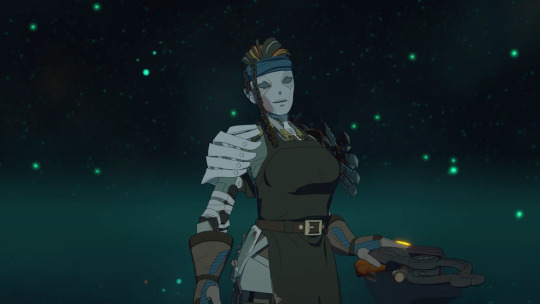
Butterflies:
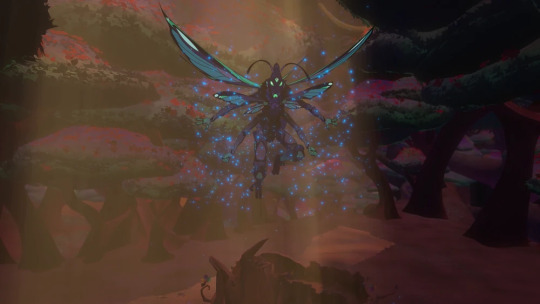

Once again, Ruby is given guided by an older and wiser woman under a tree. This time she has to make a choice to go through a transformation. A process of death and rebirth:
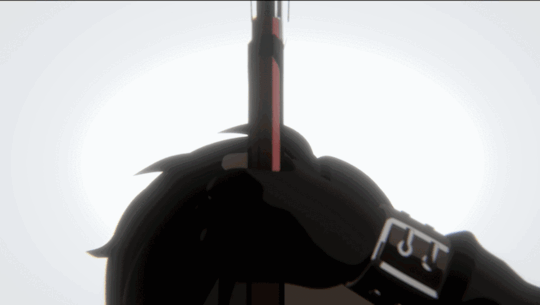
In volume 6 Ruby learns about her internal light, whereas in volume 9 she discovers her inner shadows. In volume 6 she is given knowledge, while in volume 9 she is offered a choice. At the same time, in volume 6 the Splendor Solis reference is focused on a single meaningful scene, while in volume 9 it is more pervasive and present throughout the entirety of the season. In volume 6 the Splendor Solis comments Ruby's journey (the microchosm). In volume 9 this alchemical texts conveys RWBY's adventure (the macrochosm).
However, this isn't the only difference between the two transformative trials.
IDEAL AND REAL
Volume 6 has Ruby become an ideal:

Volume 9 has Ruby grow into herself:
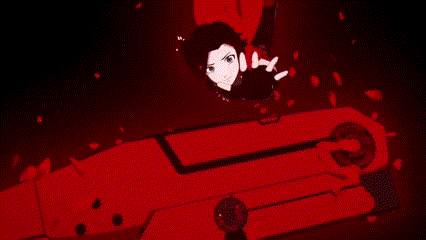
Similarly, in volume 6 she latches on an idealistic idea of Summer (the Huntress), whereas in volume 9 she accepts Summer as a person (the Mother):

This passage from ideal to real isn't something unique to our heroine's arc, but it ties to everyone's story. Here come two examples.
Jaune's arc
In volume 6 Jaune is inspired by Pyrhha to push forward no matter what:

He wants to become more like Pyrrha, his ideal self.
In volume 9 Jaune is taught by Weiss to stop and accept a loss:
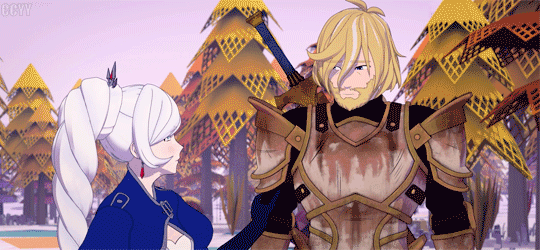
He realizes he is good as he is, despite his flaws.
Chemical weddings
In volume 6, Bumbleby goes through their second chemical wedding, where they kill Adam. The focus of Yang and Blake's relationship is that both girls have to become "worthy" of the other:
And now I know I'm worthy of you (Oh can't you see, you could be with me) With every smile you told me, "I love you" (I am your dream, I love you)
They push each other to grow and to become their ideal selves. Yang has to overcome her anger and abandonement issues to stay with Blake. Blake has to stop running away to be by Yang's side. Their fight with Adam tests their progress on their respective flaws.
In volume 9, White Knight has their second chemical wedding, where Jaune dies and is reborn thanks to Weiss. Their bond is about letting go of childish fantasies (the charming prince and the beautiful princess) and to accept the other for who they are:
Weiss: I think you’re asking too much of yourself. We’ve been telling ourselves that failing means we’re no good. But I can guarantee even the best Huntsmen in history… they’ve all lost. But they were still incredibly brave… and good.
They let go of paragons and come to love their real selves with both strengths and flaws. Their conversation in front of the Genial Gems conveys exactly this.
Interestingly, Bumbleby and White Knight foil each other in another way, when it comes to alchemical symbolism.
Bumbleby focuses on death and separation. They represent the "solvet" part of the process.
White Knight is linked to rebirth and union. They explore the "coagula" part of the process.
To be clear, the solvet and coagula parts are present in both relationships. Yang and Blake go through destruction to come back stronger and more beautiful than ever. Similarly, Weiss and Jaune have to face death, so they can be reborn.
Still, the focus of BB's weddings is on death/destruction:
Adam cuts Yang's arm and impales Blake
Adam dies
Whereas WK's weddings climax in resurrection/creation:
Weiss is reborn
Jaune and Ruby are reborn
This is because the two relationships are complementary and illustrate different sides of the alchemical process. However, there is a third ship meant to embody both parts.
RUBY AND OSCAR = SOLVET AND COAGULA
Ruby and Oscar's wedding is kicked off by their first meeting, when Qrow (a bird) brings Oscar to Ruby and unites the Solar King and the Lunar Queen:
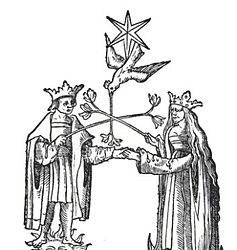
Ruby and Oscar's wedding references the imagery above.
It is a union of opposites. The scenery of their first scene together has Ruby marked as fire and air, whereas Oscar is associated with earth and water. Moreover, both the moon and sun are present.
In general, Ruby is moon, silver, red and air, while Oscar is sun, gold, green and earth. They complement each other and are perfectly balanced. So, they don't need a specific focus on neither death nor rebirth because theis arcs are gonna explore both the solvet and the coagula. They are the whole.
This complementarity shows also in Oscar paralleling Ruby during the trials of fire.
While Ruby is talking with Maria and going through an internal transformation, Oscar goes through an external transformation (he changes clothes). Ruby connects with Summer (coagula), while Oscar is free from Ozpin (solvet). Both their transformations are tested in volume 6 climax, where Ruby grows into a leader (macrochosm), whereas Oscar grows into himself (microchosm).
While Ruby struggles with herself in the Ever After, Oscar struggles with Ozpin in Vacuo. Ruby separates her perception of the self from Summer (solvet), whereas Oscar is merging with Ozpin (coagula). Ruby is in a fantastical world symbolic of the inside (microchosm). Oscar is in the real world, which is going through big changes (macrochosm).
Right now, Ruby and Oscar are bound to meet again through Raven (another bird), which might kick off their second alchemical wedding. Not only that, but Raven herself might play the part of the Nevermore, as she wears a Nevermore mask and her name alludes to The Raven, Poe's famous poem and the inspiration for the Nevermore Grimm. If so, this meeting might be Rosegarden nevermore wedding, which for RWBY ships is about overcoming grief and death through love. Another declination of solvet and coagula.
#rwby#ruby rose#oscar pine#rosegarden#white knight#bumbleby#whiteknight#rwby meta#rwby alchemy#my meta
79 notes
·
View notes
Text
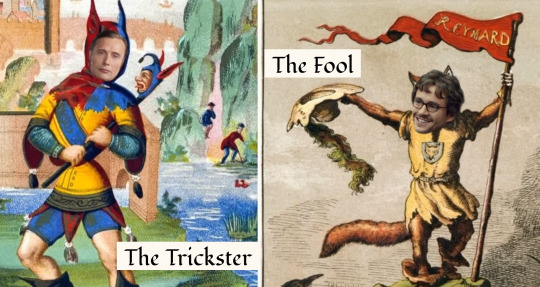
Will Graham: “The fool is presented as an innocent or naïve figure who wouldn’t hurt a fly. They are not interested in laughing at a person but rather with a person or at himself. To laugh at oneself helps to break the ice because it not only removes one’s own persona, but also the audience’s social mask, allowing for genuine behavior. This courageous feat throws one in a vulnerable state which allows others to open up and receive a message more profoundly. Fools represent values which are rejected by the group because they oppose social norms/rules. While the fool has many positive aspects, he can also be so stubborn that he does not take a moment to step back and reflect, to look where he is headed, so he falls off a cliff.”
Hannibal Lecter: “The trickster is intentionally deceptive and seeks to trick others and laugh at them. They love engaging in schadenfreude, in which one obtains pleasure from learning or witnessing the misfortunes, failures, or humiliation of another person. When there is an opportunity to play a trick on another person, the trickster immediately seizes the opportunity. The trickster seeks primarily to entertain himself, even if it is at the expense of others. He plays like a fool in order for people to fall into his trap. The trickster tricks others who never expect to be tricked.”
(The Psychology of The Fool by Eternalised)
#both are agents of change AND chaos#two sides of the same coin#hannibal#hannibal meta#hannibal memes#hannibal shitpost#hannibal crack#hannibal lecter#will graham#hannigram#nbc hannibal#hannibal nbc#murder husbands#hannibal edit#meta#Eternalised#youtube#the fool#the trickster#alchemy
61 notes
·
View notes
Note
If you were redesigning Blood Sorcery, what would its central schtick be? What makes it potentially unique and interesting, and not just a swiss army knife? (I'd argue Thinblood Alchemy is maybe a more interesting and balanced fill for that total versatility niche.)
Hm!
So, I actually kinda like the core Discipline as it exists in V5. The art of discovering truths about someone through their Blood, or manipulating the Blood directly, or turning the Blood into a weapon or a message? That shit rips. That is a good time.
I'd move Scour Secrets into Auspex (seriously, what the shit is it doing here?) and I'm turning Koldunic Sorcery over and over in my hands - it's a botch job, but the net effect works, you take that and then your upper levels are things like Visceral Absorbtion and Transitive Bond, there's a Tzimisce-sorcerer route through the Discipline and it does hold together now that i think about it. It's fine.
I think a good Discipline is one where you can cross the streams, but it's also apparent what the streams are. Blood Sorcery is a good Discipline, it has archetypal routes through for your stereotypical Tremere and Banu Haqim and Tzimisce but also space for you to push sideways and create characters who have leant this way or that.
Digression: Oblivion is a bad Discipline, largely because it has four pathways between two clans and is trying to cover two historically separate applications of mysticism and ceremony while also remaining as faithful as it can to every depiction of them that's ever existed, because it's a Dawkins design and he can't not include something that's canon. Great concept, but indulgent execution. Someone needed to say no.
But then we get into Rituals, and that's where the bloat kicks in. Niche protection? What niche protection? Haven't you heard, we're Tremere!
I think each Ritual needs to be interrogated. Ask it what it's for. Why does it exist at the level it exists? What is Clinging of the Insect for? We have Potence and Celerity powers for that. Splash another Discipline, you cowards, this is worth more than 3 XP and some bug juice.
What is Blood Walk for? Why is it not a critical effect on Taste for Blood, the mainline power that's its obvious prerequisite? This is stupid. Merge them.
What is Wake With Evening's Freshness for? Why do Tremere get to do this, for cheap? Get rid of it.
Do that, and pare the Rituals right down to the ones like Enrich the Blood, Herd Ward, Calix Secretus, the ones that are clearly derived from actual Blood manipulation. To be honest, the Oblivion notion of prerequisite powers is a good one, and if you can't think of a good prerequisite power, chances are you don't have a good Ritual - you have an Ars Magicka wizard spell that nobody's had the spine to delete.
I've said before and I'm saying now that I prefer Tremere as alchemists to Tremere as mages from Ars Magicka backformed into mages from Mage. It shucks off a lot of baggage, it makes them a self-contained Vampire concept (this is a problem I also have with the Giovanni, to be entirely fair), and - in the context of this ask - it also creates some cool parallels with the thin-bloods, the Duskborn of the here and now. Tremere looks to Thin-blood: as you are, we once were. As we are, you are not allowed to be. No wonder Tremere invented the practice of branding the little shits.
I do agree that being a hyperflexible little multi-tool, manifesting semi-random powers from Resonances and cultivating specific counterfeits with Alchemy, is a really good niche for Thin-Bloods to occupy. The Revised era version - "vampire from clan, but shittier" - had no appeal outside of specific metaplot-hugging or masochistic playstyles. The V5 version is exciting. People should play them, and want to play them.
That said, I have some beef - specifically, a Thin-Blood who lives long enough and plays with other clans erodes niche protection by being able to counterfeit most Disciplines a PC from another clan can bring to the table, "anything you can do I can do" kind of deal. Level 5 is off the table, but how many PCs are getting level 5 powers at the standard rate of XP gain? Blood Potency is a counterbalance and if you bother to implement its rules all the way across (the rerolls are super important) I do think it works as a balance, but this isn't about what works. It's about the feeling of having your special snowflake power, and yours, and yours, all available to this one character.
I think I'd get rid of Counterfeit Discipline, as a thing: you can curate low level powers from feeding, and you have unique Alchemy effects, and that's enough, actually.
17 notes
·
View notes
Text
I’ve ended my post about Mary as a symbolic gift by saying that there wasn’t real space in the show for a Mary who was “not just a mom” but, truth be told, I think there wasn’t real space in the show for any character whose story wasn’t connected to Sam and Dean. As far as I’ve understood the show, the obsessive focus on Sam and Dean is both its main strength and its main weakness and I think that the finale showed it.
It’s not news that in SPN every side character who stops being useful to the plot dies. Or they die because their death is instrumental to the plot and/or the emotional arc of either Sam or Dean. Or both. This is true of every era and, I believe, it’s a rather foundational aspect of the show. This is the reason why, from a general narrative pov, I often compare the brothers to two cosmogonic forces because they are the ones creating their world which is THE world where everything and everyone depend on their story. There’s even an episode, “Weekend at Bobby’s”, where Sam and Dean sort of get called out because they only seem to care about themselves. Which isn’t true (well, more or less I'd argue, lol) but it is true that the show is exceedingly concerned with them and them alone. This extreme focus on the main character(s) is something that I haven’t found in any other show, to be quite frank with you.
Partial exceptions are Jody, Donna and the rest of the Wayward Sisters but that’s just because they wanted to use those characters for a spin-off. In reality we never know what happens to them after “Inherit the Earth”, what happens to Eileen, to AU!Bobby, to AU!Charlie, hell even to human Chuck. A good opportunity to show them one last time and tell us what happened to them would’ve been at Dean’s funeral. A funeral where nobody shows up. I know it was because of COVID restrictions but they still filmed and left that scene. So they wanted to tell us something with that, wanted us to see it. And we saw it, which I take as a way for the show to tell us that the story was really over and Dean’s death was final. I don’t want to go into the big “family is hell” vs “found family” debate but wherever you are on the two sides of the argument you kinda have to admit that it was very sad and quite cruel to show us that nobody attended Dean’s funeral.
The other exceptions are Crowley, Rowena and Castiel, three characters that have their own individual storylines that, to the surprise of no one, end when they get inextricably linked with that of the Winchesters. Crowley dies slowly and painfully of the Winchester Derangement Syndrome, whereas Rowena is revealed to be united with Sam in death. Her death. Castiel is the only character who escapes this narrative destiny right until 15x18 where he says that the reason he cared about the world was because of Dean. And then he also dies.
Perhaps the association between “worlds” and the “brothers” is at its most blatant in S13 where the Alternate Universe is a universe without Sam and Dean and, therefore, a boring universe, imo. And when I say “without Sam and Dean” I don’t mean in the sense that they were never born there but that they never even stepped foot there until, like, the last three episodes (and, by the way, they made them act like total dicks bossing around people in a war-zone.). This is not to say that, for example, Original Bobby (since I’ve mentioned him before) doesn’t have his own story, quite something else. This is to say that the vast majority of side characters in SPN have their own stories but their own stories only serve to “mirror and parallel” Sam and Dean’s. In other words, other characters’ stories are, apart from the above exceptions, always functional to the cosmogonic brothers. Case in point is that episode in S15 where Chuck eliminates all other worlds/drafts because what he cares about are “our” Sam and Dean. Sure, that was a jab at all the failed SPN spin-off but, again, this proves my point: people, much like Chuck, are interested in Sam and Dean and Sam and Dean alone (Big hello to those two Sam and Dean hopefully living a good life in Brazil, cheers! Or did Jack fix that as well? Who knows!).
The reason why Sam and Dean are absent in the Alternate Universe is not because they’re dead or were never supposed to be there but because Mary didn’t deal with Azazel. This interests me a lot because the cosmogonic aspect here is Mary’s choice: Mary is, de facto, a creator of worlds. Two to be precise but still, not bad. Now this would actually be an interesting spin-off, right? A series where Mary is one of the main characters and we get to focus on her? Oh wait, there is a spin-off about that. Or at least I think this is partly what “The Winchesters” is about because I haven’t watched it yet. It was, sadly, canceled and I don’t know why (these days they cancel shows according to the mood of the day apparently) but I’ll have to go with the current obscure ways of making profit in the media industry (as far as I know, people have no access to data to understand why certain decisions are made). This is, after all, the real world and in the real world god is profit and not a writer.
The centrality of Mary’s choice in S13 is not part of the original story that, on the contrary, was based on the notion that everything was predetermined and the struggle of our main characters was exactly this: will they or won’t they be able to exercise free will? However S13 reframes the original story because now what is deemed to be relevant is whether or not Mary is just a mother or… “not just a mom”. To use an image that’s become dear to me, the main weight put on one scale was still imagined motherhood: Mary as a character could only compare&contrast against that, against herself (as originally conceived by the narrative) and how she had imagined herself to be. She is therefore never fully free from being Sam and Dean’s mother because she’s never fully free from her own imagined motherhood. Which means she’s never fully free from her Special Heaven where she’s fake-happy with two fake-babies in a fake-perfect house and with who must be a fictional, imagined version of John. Which means that she’s not complete.
I mean, I'm surely not the only one who sees the illogicality here: Mary represents a myth about motherhood and safety and this myth takes the form of a nuclear family living in suburbia with the infamous white picket fence. Okay. She comes back to life to debunk this myth and we see that she's actually very different from how she was portrayed because she's adventurous and wild and taciturn but also leader-like, cold and secretly very sweet. Again, okay. But then she dies and we're told she's complete but we're also told (we don't see it, we're told) she's in a Special Heaven with John which, by the way, sounds very suspisciously close to Heaven's Prison. Fine, alright, okay! BUT THEN what is Mary's heaven (and, later on, everybody's heaven)? A myth about family and safety in the form of a nuclear family living in a sort of overexposed country-side. Like, what???
As I see it, what was needed to deconstruct Mary’s myth was for her to come to terms not only with the fact that her sacrifice was made in vain because there’s (apparently) no escape from the hunting world, but that she had deceived herself. For example, she might have discovered that she kinda doesn’t like leading the imagined life she used to dream about or perhaps her dream was always tainted in real life by what happened with Azazel so she never felt safe anyway, thus removing the one thing she ever wanted by getting out of the huntig world. I could go on and on but what I want to say is that it’s not enough, for me at least, to know that Mary likes to fuck and used to feed her children store-bought meals. This is cool but accessory. Do not show me the conflicted emotions of a character re: her past choices by giving me a WORLD where that character doesn’t make said choice (and therefore feels better about it). Let me see her as she realizes she was also going after a myth, let me see her as she realizes that the man she loved went basically half-mad with grief after her death, let me see her as she realizes how sorrowful her sons’ lives have been. Let me see her interact and generally be around the main characters/focus of the show.
As I’ve said, she couldn’t be free from her own myth because the narrative still needed her for Dean to be free from his own myth. To be honest I think it was a very cool idea and the two things could’ve been done together (I think it’s clear by now that I feel sorry for Mary as a character but that doesn’t mean that debunking the image of a parent isn’t a cool concept to write about). However, it totally was a retcon because S11 Amara, as much as I adore her, didn’t have the experience nor the emotional tools to understand such a deep human concept. She understood that humans need to experience/feel unconditional love and that this love can take the form of parental love from a time when humans are babies that need to be nurtured and cared for. So she saw a picture of Dean and Mary and, by virtue of her bond with Dean, she thought: oh now I get it! And she was right!!! But, like, human relationships are OF COURSE more intricate than this and there’s no way she could’ve understood all this in S11. If she had really understood it she would’ve never brought back a person just for another person to learn a lesson.
This ultimately also proves my point: Mary couldn’t be anything else than a mother in the show because the show itself is focused on Sam and Dean and everybody else depend on them to stay or not in their story. Mine is not necessarily a criticism, on the contrary, the show strikes a real chord with the mythical parent vs real one. But it didn’t let us see it because they decided that bringing back Mary just for her to be a mom would be awful. And they were correct! but, again, you can’t just bring back a central character like her and then spend the rest of THREE seasons writing her OUT of her sons’ story just for her to re-appear on time for her scheduled appointment with the fridge.
But they couldn’t do it because to have Mary back as a real fucking person would have meant, at some inevitable point in time, for the show to have her and her sons sit down and seriously talk about what the fuck happened since her death. To talk about John, to talk about the abuse, to talk about the demon blood, Hell, the Cage, the mark of Cain and, oh by the way we killed grandpa! Which means the show would have had to directly deal with trauma and they clearly didn’t want to go there. Only parallels and mirrors, mirrors and parallels. Mary never left that fridge.
#the one where I finally explain what I mean when I say that “Mary is complete” is bullshit#don't try to give me the “dabb was using elements of alchemy and.junghian psychology” because I sincerely hope that's not the case#because that would either mean that those things were used incorrectly#or that they were used against what they mean#so i prefer ignorance in this case. lol.#to be fair s12 mary is cool. well. she's always cool but my beef is with s13 and s14#because well. s13 stopped making sense after “tombstone” and S14 well. I don't think it's a good season#like some individual episodes are cool. but the season in general is only as cool as the meta i've read about it#but like. the real thing? it was meh. it was a s10 without the guts of s10.they really made them Do Things in S10.#super-m/Others#spn#supernatural#spn s13#spn s14#b/w spn#mary winchester
9 notes
·
View notes
Text
Alright.
I'm on a streak about the anachronism of condom in Amestris.
Hear me out.
Rubber condom date from the 19th century. They came from rubber cast into cement molds.
It wasn't until around 1920 that latex was invented.
Which was possible due to chemical advances and the industrial revolution first, than industrial progresses in assembly lines second.
*But*.
Amestris don't rely on chemistry.
All its technological advancements rely on **al**chemy.
And yeah, there's automails, but it's done by experts in individual workshops. Not in big factories by machines which can churn them by the dozens.
Look at their reaction in CoS when a plane come through the portal. Total bewilderment.
Due to the "ease" of doing alchemy and how impressive it is, centuries ago, the world of FMA turned their research and technological progress in the direction of alchemy.
Which enable them to do things we weren't capable of, at the same period in time, *but* the reverse is also true!!!!!
The technological progress that allowed for the creation of latex condom and its wide distribution is just not there yet.
Latex condom *could* be made, possibly, like automail. By civilian alchemists in their own private workshops and sold at the front of the shop.
But masse assembly lines that allow the production of materials and goods in nation-worth quantity, at a speed to keep up with national wide demands and cheap enough to beat private contruction/creation by individuals, that absolutely require machines of type that don't seem to exists in Amestris/FMA because their technology hasn't evolved in that direction.
Therefore, latex condoms don't exist yet at the time of Edward's story.
Or, if it does, it's "unique pieces". Like pharmaceutical creations, goods made in the back of the shop by experts for one use only.
Must be wayyy more expensive than the ones we currently enjoy.
Also, you must have variations of quality, since you will have variations of quality of raw materials, alchemical arrays and skills.
They won't be one hundred percent safe everywhere so there wouldn't be as much "faith" in their effectiveness than we currently have.
There was a whole part of the population at the start of the century who thought they made sexual intercourse feel not as good as "bare" intercourses do. And since they aren't 100% sure, why bother, you know?
Of course, it wasn't everyone and the condoms themselves got better and better (in feels and safety) overtime but it didn't happened in a day.
Right until the early 2000, you still have big parts of the population who thought they were more problems then they were worth.
Still some do, today.
So, to write that people of Amestris buy, use and view condoms like we do nowadays is just anachronistic.
And now I want a fic where the people in Team Mustang have a discussion in the office about which shop sell the best ones and at which price and who tried what to "test" them.
And Mustang has so many facts and everybody is just??? "We knew you got around but not This Much" But really these are tips he picked up from Madame Christmas and all the sex workers he has ever known since he was four.
So, like, he is infodumping twenty years worth of Usefull Tips to be a helpfull good boss. And his team is like "you want to talk about it?"
#fma#fullmetal alchemist#amestris#technology#alchemy#condom#condoms#fma meta#roy mustang#team mustang
25 notes
·
View notes
Text
Chewing on my enclosure thinking about how the TMP universe is set up and what the FUCK this world's version of the entities are/when the TMA entities crossed over.
That whole encounter with Newton was obviously a manifestation of greater alchemy, but was it also an olde timey manifestation of the stranger, given how WRONG the statement giver found everything (given all his talk about good reason, and being unnerved about the dog escaping it's place in the godly hierarchy) ?
Oscar Jarrett's tattoos are likewise giving me all sorts of things to think about.
The sun symbol burning a guy alive makes sense on the surface but if you know anything about alchemy you'd know that the symbol of the sun (specifically the one with the dot in the middle) is a symbol of gold, NOT the process of calcination. I'm mostly discounting desolation because despite the burning the iconography just feels wrong.
The ship tattoo is free of obvious alchemical symbols and seems almost...infectious, making the groundworks boss obsessed and reverent just by looking at it, while disappearing the coroner and possibly the government contact aswell. The subject matter is very entity-ish (flip a coin for vast or buried, I'm leaning the latter for how often "closer" is mentioned) but that raises the question of WHEN the TMA entities crossed over into the TMP-verse.
These tattoos are almost like Leitner books, carrying power that threatens to devour most, but empowers those individuals who happen to align with them (the artist and the paintbrush). Difference being that Leitner didn't WRITE anything in his library, and Oscar Jarrett (and now inksoul) seems to be handing out different flavors of horror to each individual.
17 notes
·
View notes
Text
Syzygy, or Animus and Anima: Weiss and Jaune
Anima-Animus anon, here is your meta. I genuinely do think Weiss and Jaune are one of the best literary examples I've seen of animus and anima, respectively. This is not inherently a shipping meta, although you could read it that way.
Of note: I did talk about Jaune and anima before here in a larger meta about his arc, and about Weiss and animus here. But I want to talk about their arcs because they are complimentary, and really encapsulate how to write anima and animus pretty perfectly.
So let's go over it. What is anima? What is animus? How is Jaune one of Weiss's animuses? How is Weiss one of Jaune's anima? And what does this mean thematically for their arcs and the work of RWBY as a whole?
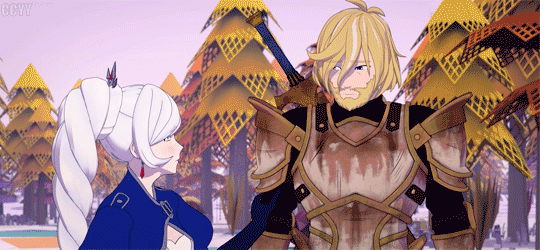
Jungian Archetypes
I have a whole meta on Jungian archetypes in RWBY. But I just want to quickly go over some of them because I'll use these terms in the meta.
Persona: the part of ourself we present to the public. It's usually somewhat fake, or at least societally acceptable.
Shadow: the part ourselves we repress because we do not want to acknowledge the parts of us that are selfish, hurting, weak. End goal: integration with the shadow and accepting that these are parts of you. In literature, the shadow is often negative or antagonistic if embodied in a character, because facing it requires facing character flaws. However, only by integrating with the shadow do we start to heal. It's necessary to become a complete person. Associated with the Black stage in alchemy, and with Blake.
Anima/animus: the feminine/masculine within ourselves. This can overlap with the shadow in some ways (for example, men often don't want to admit that they're weak). Anima/animus can be positive and negative. Associated with the White stage in alchemy, and with Weiss and Jaune. You don't have to interpret it as romantic, but it often is.
Self: The Self is the end goal of Jungian psychology: achieving individuation, or the fullness of being who you are and knowing your role in the world. Associated with the Red stage in alchemy, and with Ruby.
Syzygy: the union of anima and animus.
Lastly, I want to disclaimer about the terms "masculine" and "feminine" here. Jung was writing at a time when gender binaries and roles were very much a thing. Of course they apply less today (and RWBY deliberately plays with some of these, as we'll see). But when I use the term "masculine" or "feminine" in this meta I mean in the traditional sense Jung is talking about. Masculine=bravery, physical power, fear of the weak. Feminine=beauty, emotions, kindness, etc. Please note this is clearly oversimplified and I am not endorsing this, just explaining a pattern that Jung pointed out in regards to literature.
Jaune and Anima
Between anima and animus, anima is more likely to be romantic in fiction. That's because Jung associated anima with something he called Eros (Greek for romantic/sexual love). A man's anima is also almost always one person at a time. This is not the case with animus, as we'll see.
Hence, the two women associated with Jaune's anima are Weiss and Pyrrha.
The previous meta I did on Jaune's arc makes a strong argument that Pyrrha firstly embodies his anima. She almost perfectly goes through the first three of four stages of anima in regards to how Jaune views her, which are:
Eve (mother)
Helen (romantic interest)
Mary (religious devotion)
Sophia (wisdom, guide to the inner life)
I would also argue that Pyrrha embodies Sophia too here, but the living Sophia is also Weiss. Sophia is Greek for "wisdom," and both the official RWBY Twitter account and the show itself make the connection explicit for us, with the Curious Cat calling Weiss "wise Huntress."
But it's also deeper than just stages here. Jaune's entire arc is about the rejection of toxic masculinity and the embrace of his own role as maiden. Only through becoming a Maiden (in other words, embracing the feminine within) can he become a Knight (the man he was meant to be).
Jaune As The Maid of Orleans
Jaune's allusion is, of course, Jeanne d'Arc. He has a feminine allusion, which tells us to expect his integration with the inner feminine. Joan of Arc was also know as three things:
A spiritual guide to France in wartime
A soldier/knight
A maiden
In real life, Joan of Arc was dismissed because she was just a girl... until she started actually winning battles and her predictions came true. God or not, there's something really powerful and intriguing and eerie about her story. Joan of Arc referred to herself as "Jeanne la Pucelle," or "Joan the Maiden."
But what is a Maiden? In Joan's time, it literally meant "virginity," because there was a prophecy that France would be restored by a virgin. In other words, her virginity was a strength--spiritually, at the time period, her going to war with men yet maintaining her virginity was seen as a sign of righteousness (yes, it was very anti-sex).
In RWBY, a maiden is also hardly a weakness. No, a Maiden is a specific type of power.
It's also associated with martyrdom.
Jaune has had special relationships with several of the Maidens in the series: firstly, Pyrrha, who chooses to kiss him (a nice pro-sex commentary honestly) before dying as a Maiden even though the power had not been transferred to her. Pyrrha ends up a martyr like Joan of Arc, but her legacy, like Joan's lives on. Pyrrha embodies what Jaune should become.

Penny, of course, dies as a martyr too. She is stabbed by Cinder and there isn't time to save her. Jaune, who defines himself as a healer thanks to his semblance, has no choice but to kill her so that Penny stays in control of her destiny. It's tragic, but like Pyrrha, it isn't empty.
Of course, Cinder has now killed Jaune's first love interest, tried to kill another (Weiss), and then made Jaune into a killer via stabbing Penny. Hence, Jaune and Cinder are also linked, and the message of what a maiden should be, and what destiny is--the message Pyrrha carried, the message of choice embodying destiny that Penny carried--is something I suspect Jaune will give to Cinder before the end.
Still, all of these incidents, the three big alchemical deaths of the series--Black Death, White Death, and Yellow Death (Crocea Mors)--involve Jaune and specifically switch the gender of what you would expect from a hero.
The Knight is supposed to protect the Maiden. Instead, the Maiden kisses Jaune and locks him away to save him while she fights Cinder. Jaune is supposed to protect the Maiden, but she (Weiss) gets impaled precisely because he couldn't get over his previous failure to save Pyrrha. This time, though, he saves Weiss.
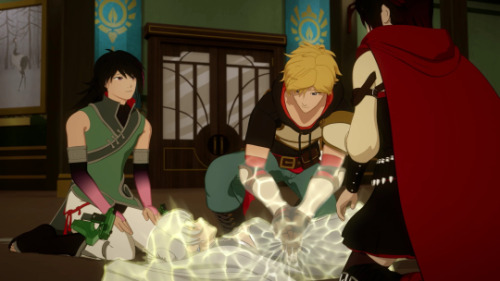
The thing is, though, that healing is traditionally a feminine attribute. Hence, Weiss lives and Jaune heals because, symbolically, of his ability to embrace the inner feminine.
Lastly, the Knight is supposed to save the Maiden. But instead, saving the Maiden looks like becoming the monster himself, like becoming his shadow (which Cinder is). It shatters his sense of self, as we've been seeing throughout Volume 9.
If a Knight is also a dragon killing a maiden, who is he?
Jaune As The Rusted Knight
Jaune's sword is broken, and he intensely clings to this persona of "knight who saves" the entire volume. But by intensively insisting on saving the Paper Pleasers, he doesn't realize he's repeating what Ironwood et al did to Penny: refusing to allow them their own right to choose their destiny. He also fails to save Alyx.
Jaune's "knight who saves" persona has been a key part of his character since the first season. He cheats to get into Beacon because he wants to be a hero and carry on his family's legacy. He's embarrassed to be so weak, but the only way to become strong is to rely on women. Team RWBY, Pyrrha, even Nora and Ren (who don't fit gender stereotypes themselves).
Pyrrha literally trains Jaune. Notably, whenever Jaune relies on male advice, he fails. In fact, his knight persona is precisely why Weiss doesn't like him at first (not just romantically; like, at all.)
Weiss: (separating the two) Jaune, is it? Do you have any idea who you're talking to?
Jaune: Not in the slightest, snow angel.
Jaune: I don't understand. My dad said all women look for is confidence! Where did I go wrong? (accepts Ruby's offered hand and uses her to lift himself back up)
Yang: "Snow Angel" probably wasn't the best start.
Jaune's confidence and understanding of women coming from his dad instead of like, actual women, means he's going to make an arse of himself. And he does. At first.
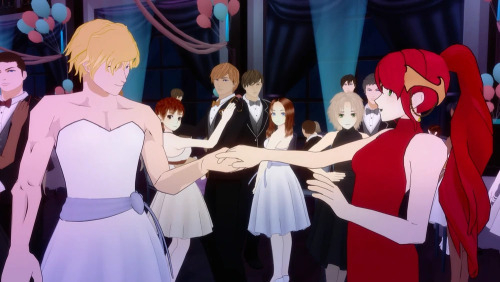
But, Jaune starts to integrate with the feminine through not just Pyrrha training him physically, but also through doing things like dressing up as a princess and going to the dance like that to honor his word to Pyrrha. He gets closer to Weiss by talking to Neptune about feelings rather than by impressing her through feats of strength. He then saves her life via delving into a traditionally feminine power. And in the end of Volume 9, he is restored to his young self via Alyx, the girl he thought he couldn't save.
Weiss and Animus
Oh boy, animus.
Okay, so... Jung did not write nearly as much about animus as he did about anima. Supposedly that's because he's a dude and recognized that he could not actually experience animus. Fortunately, his wife Emma wrote a lot about it, as did some direct colleagues (like Marie-Louise von Franz) who specifically applied animus to its portrayal in fairy tales.
Animus differs from anima in a few key ways. The centrality of the concept--that it's the masculine within a woman--remains the same. However, animus:
is not usually limited to just one person at a time like anima;
doesn't follow stages nearly so neatly (they exist but are a bit... debatable)
is not inherently based on Eros, or a romantic understanding. No, instead animus is based on Logos.
What is Logos? Logos is literally "word" in Greek, but the actual usage is more akin to "mind" or "spirit." Weiss, of course, is a mind character. It can also refer to the principle of the matter. In other words, a woman looks for her masculine traits in a principle she holds dear.
Jung himself said:
The male personification of the unconscious in the woman — the animus — exhibits both good and bad aspects, as does the anima in man. But the animus does not so often appear in the form of an erotic fantasy or mood [as the anima often does to men]…even in a woman who is outwardly very feminine the animus can be an equally hard and inexorable power. One may suddenly find oneself up against something in a woman that is obstinate, cold and completely inaccessible.
Weiss as Princess Snow White

Weiss starts off possessed by her negative animus, the Logos or principle.
What is animus/anima possession? It's specifically a negative manifestation of the animus (or anima) wherein someone behaves overwhelmingly like their masculine side--but in a negative sense. In other words, for Weiss, this looks like a persona of toxic masculinity.
Possession caused by the anima or animus presents a different picture... The animus is obstinate, harping on principles, laying down the law, dogmatic, world-reforming, theoretic, word-mongering, argumentative, and domineering.
I kinda do think this sounds like early-volume Weiss. But it also sounds like... Jacques Schnee.
See, the animus is also often a reflection of a woman's father. Even though Weiss is determined to prove herself without her father's influence by the start of the series, we also see that she is in some ways behaving like him. Of course she's not nearly so ruthless or bigoted, but she does maintain some prejudice about faunus, maintains entitlement (demanding to be leader of RWBY), tells off Ruby for accidents, etc. She's denying her femininity.
But then her development starts, and with this, her animus changes. Who are her animus?
Well, as I said above, animus has multiple presentations, and for Weiss they're specifically unique... because some of them are women. Make of that what you will, shippers and headcanoners. I'm not just going off of nowhere in saying that I think some of Weiss's masculine animuses are women, either; I'm specifically talking about it in regards to Weiss's allusion of Snow White.
You can find numerous fairy tale analyses with animus/anima interpretations. Snow White is one of the most obvious ones. But Weiss's Snow White is genderbent... mostly. Except for her.
See, in the Grimm version of the fairy tale, Snow White's father is alive. He just does absolutely nothing to stop his wife from abusing Snow White. In this story, Willow, Weiss's mother, is the absent one, doing absolutely nothing to stop Jacques from abusing her children. As a result, we have the Shadow develop--in the fairy tale, the Shadow is the Evil Queen. In Weiss's story, it's Jacques. He is who she doesn't want to be, but does have similarities to especially in her persona.
Snow White then meets nine other men. Yes, there are a total of ten male characters, and they are all aspects of animus. In the original Snow White fairy tale (reference this analysis), we can break it down as such:
Absentee dad
Huntsman
Seven Dwarves
Prince
In this, we can see slow progression of Snow White's integration with her masculine side.
Firstly, it's denied to her (she's completely out of balance) because her father refuses to take any action and is never mentioned again.
Secondly, the Huntsman takes action and spares Snow White from the queen, but also doesn't exactly help her. He sends her off into a dangerous forest to fend for herself.

Thirdly, we see reciprocity finally appear. Snow White helps the dwarves, but they also help her. It becomes a mutual relationship in which she learns from all seven of them.
Lastly, Snow White is revived thanks to the prince, who marries her as an equal.
When we compare this to Weiss's arc, we see similarities. Willow is absent, denying her what she needs. Then, Winter play the role of the Huntsman, helping Weiss forge her own way to a degree but still leaving her to rely on herself when she could maybe use a bit more help.
Thirdly, Weiss meets RBYJNPR: her seven dwarves. She learns how to be herself, learns who she is, in great part because of them.
Lastly, this volume we have her developing an attraction to Jaune, whom she knows and who has revived her. She gets to be fully Prince and Princess.
What About Stages?
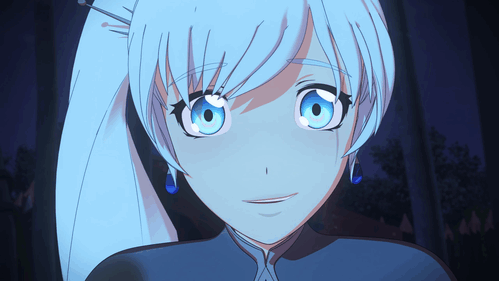
The stages of animus, when they exist, are loosely defined (as in Jung himself didn't actually say this, but is often attributed as having said it) as:
Tarzan: physical power
Byron: man of action or romance
Lloyd George: man as a professor or orator
Hermes/Mercury: man as a spiritual guide
If we look at this through the lens of Weiss's arc, we do see traces of these. The physical power Weiss is attracted to is embodied in Winter and Pyrrha. I mean Weiss specifically calls out Pyrrha's physical strength when she meets her:
Weiss: So, Pyrrha, have you given any thought to whose team you'd like to be on? I'm sure everyone must be eager to unite with such a strong, well-known individual such as yourself! Weiss: This will be perfect! The smartest girl in class combined with the strongest girl in class! Together we will be unstoppable! I can see it now! We'll be popular! We'll be celebrities! We'll get perfect grades! Nothing can come between us now!
The man of action/romance is embodied in the Rusted Knight persona, and in Neptune, who is notably a giant flirt.
As a professor or orator, I would actually say there are many here. Klein, of course, reminding her who she is. Then there is Robyn, who is probably the most obvious orator in the story. Also Ironwood. Basically, thanks to Robyn having the election stolen from her, Weiss helps take down her dad. As a result, her mother returns to her (the feminine returning) and she is able to get Whitley to help save them all (integrating the masculine).
We also see a little bit of this later on with Jaune, in that Weiss expressly says she admires his maturity.
The technique of coming to terms with the animus is the same in principle as in the case of the anima; only here the woman must learn to criticize and hold her opinions at a distance; not in order to repress them, but, by investigating their origins, to penetrate more deeply into the background, where she will then discover the primordial images, just as the man does in his dealings with the anima.
We're not quite there with Hermes/Mercury, and I would bet that Jaune won't fully become gold or a spiritual guide unless he, well, has something to do with saving Mercury Black. The allusion is too literal not to be used.
Weiss as Knight
Weiss has always been a knight in addition to being Snow White, a maiden princess. Weiss defeats a knight-like creature (Arma Gigas) in the White trailer, and then goes on to be able to summon Arma Gigas as part of her semblance thereafter.
She's exceptionally talented in combat. In fact, the person Jaune calls to save Pyrrha when she's gone to fight Cinder is Weiss. He begs her to save Pyrrha, and Weiss promises him she will.
Sadly, just like Jaune in his attempts to be a knight, she can't, but not for lack of trying.
Later, in Volume 5, we see Weiss receive a power up that comes from her soul (another word for anima). The knight imagery becomes even more part of her semblance, as @aspoonofsugar has written. Notably, she summons Queen Lancer (literally referring to both the maiden-princess and knight archetype) after Jaune heals her in Volume 5. In other words, it's part of her integration with Jaune.

Then, Volume 8 happens, and Jaune again tries to rely on Weiss. He insists to Penny that "Weiss will buy us time" to heal Penny. And she would have tried (and probably died). But Penny tells Jaune that he's the one she needs to do something brave. It's his time to be a knight.
Weiss similarly expresses confidence that Jaune would have done the best he could after she arrives at the Ever After, unaware that he's fallen, too. Even as they go through the Ever After, Weiss affirms her Logos: herself, which is defined by her heroism and her failures.
Weiss: I don't know who you think you are, but let me tell you who I am. I am the granddaughter of a hero and the child of a villain. I am a citizen of a fallen kingdom and an heir to nothing. I will not be defined by my name because I will b e the one to define it. I am Weiss Schnee, and I am a Huntress.
And then we have the finale of Volume 9. Here, Weiss is the one to give Jaune words of wisdom, to encourage him after the Paper Pleasers return as jewels and Jaune realizes that he was not only holding them back, but holding himself back (literally, Jaune, despite being older, has not grown at all emotionally; he's stagnated. He's not a 40 year old in a teen's body; he was a teen in a 40 year old's body). Weiss tells Jaune what she told her younger self:
Jaune: I wanted the rush of rescuing someone, and I got that here.
Weiss: I think you're asking too much of yourself. We've been telling ourselves that failing means we're no good. But I can guarantee even the best Huntsmen in history? They've all lost. But they were still incredibly brave. And good.
In response to this, Jaune starts to cry (a traditionally feminine trait!), and Weiss asserts again what her Logos is: being a knight and a maiden, being brave and good, even when that means you can't save everyone.
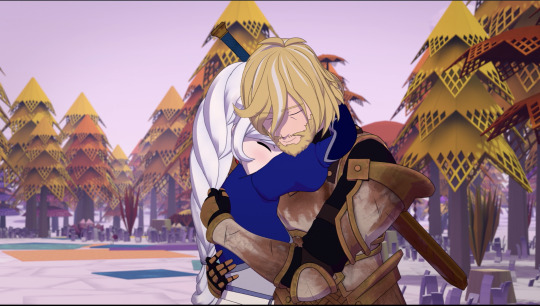
So then they fight together, again.
But it's another reversal. The princess, instead of being saved by the knight, almost kills the knight with fire in a scene that comments on what happened with Pyrrha, Jaune saving Weiss, and Penny.
Integration of Knight and Maiden
What's interesting about the Pyrrha-anima-animus connection is that it is Weiss who introduces Jaune to Pyrrha in the first place. Weiss wants to be Pyrrha's partner, actually. She deeply admires Pyrrha, as shown as she says about her and Pyrrha in that first meeting:
Nothing can come between us now!
What immediately comes between them is Jaune. Literally.
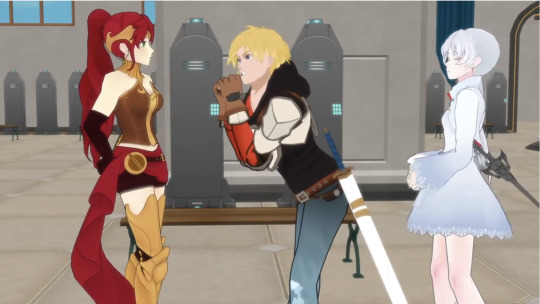
But it's not Jaune coming between them in an icky two girls can't get along because of a boy love triangle way. No, instead it's the three of them united because of their relationships with each other.
In that same scene, the very first, we have Weiss literally asking Pyrrha to intervene and get Jaune away from her by throwing her spear... which she does. The symbolism of Weiss asking Pyrrha to throw her spear into Jaune is uh. It's Freudian. Let's leave it there.
In fact, Jaune's feelings for Pyrrha start to develop as a result of her training him physically and encouraging him about his crush on Weiss. Hence, Weiss has been a part of Jaune and Pyrrha's relationship since the start of it; all three of them have an inextricably intertwined relationship.
Then, when Pyrrha says goodbye to Jaune and kisses him, it's right before shoving Jaune into a locker, the same as the ones she met him in front of. This time, when Jaune's in trouble, he calls Weiss--understanding that he needs someone else to save Pyrrha, and trusting that Weiss can do it. Jaune calls Weiss, because she's a knight. Unfortunately, she can't save her.
In Volume 5, Jaune saves Weiss precisely because his grief over Pyrrha contributes to Cinder impaling Weiss. Pyrrha is central to Weiss and Jaune's bond. Pyrrha and Weiss have always been intertwined as Jaune's anima, and if they do end up going with romantic White Knight, they would never have happened if it weren't for Arkos.
While I often see early-volume!Jaune's feelings for Weiss dismissed as shallow, I don't think they actually are. I think they're immature, sure, but look at what he tells Ren about Weiss:
It's Weiss... I'm completely head over heels for her, and she won't even give me a chance. She's cold, but she's also incredible. She's smart, and graceful, and talented-- I mean have you heard her sing? I just wish she take me seriously, y'know? I wish I could tell her how I feel without messing it all up.
Jaune clearly always did see the actual Weiss, not just her beauty, physical strength, or name. Yes, he was initially attracted to her persona, but the undercurrent was always real. Even Snow Angel.
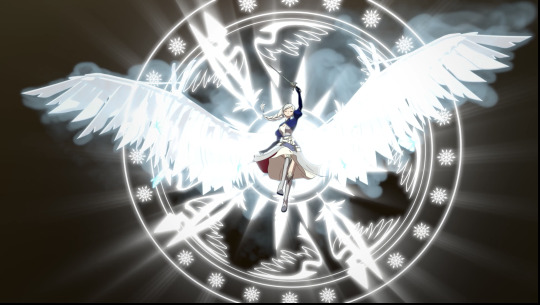
The problem is that Jaune could never be with Weiss if he remained in his Knight persona, expecting her to take the princess role. No, instead, they both have to be knight and princess.
Knight and maiden have never been more clearly integrated than in Volume 9's portrayal of Weiss and Jaune. Jaune is the legendary "Rusted Knight." But, he turns out to still be a Maiden literally waiting around a tower/house for rescue in the form of Team RWBY.

When the Jabberwalker comes, Jaune and Weiss fight together just like Bumbleby fight together; this is explicitly paralleled. (Also, Weiss kind of ignores her fighting partner, Ruby, which contributes to Ruby's feeling lonely; this isn't inherently wrong because they like, needed to stop the Jabberwalker, but it still, well, is, and is also emblematic of Ruby feeling left behind).
During this fight, Jaune tosses his sword to Weiss, who expertly wields it despite it being broken and then gives it back, therefore symbolizing that Weiss can be the knight, that she can be the masculine one, and letting her do so is actually not emasculating for Jaune. Instead, it's realization of his potential in being both knight and maiden.

(And, let's not get into the very very basic Freudian symbolism 101 of a woman using a man's sword.)
The Maiden, instead of being saved by the knight, almost kills the knight with a baptism of fire.

In fact, in Jung's own writing on the philosophical tree (yes, really), he notes this:
The lapis signifies the inner man... the natura abscondita which the alchemists sought to set free. In this sense the Aurora consurgens says that through baptism by fire "man, who before was��dead, is made a living soul." ... The genuineness or in-corruptibility of the stone is proved by the torment of fire and cannot be attained without it. This leitmotiv runs all through alchemy.
What is funny here is that Jung uses "lapis" here to mean the philosophical stone, which is most commonly called a ruby. But it can be a sapphire, or apparently a lapis lazuli. Go google the color lapis and tell me that that is not exactly Weiss's dress color.
Like Joan of Arc, Jaune is consumed by the fire. He is coagulated after the dissolution of the Paper Pleasers. But instead of coming forth as ashes, he comes forth as gold... with some growth still ahead and with some white streaks in his hair, symbolizing integration with the feminine (white=feminine in alchemy and Jung).
So where do Weiss and Jaune go from here? Jung provides a clue:
“Just as the anima becomes, through integration, the Eros of consciousness, so the animus becomes a Logos; and in the same way that the anima gives relationship and relatedness to a man’s consciousness, so the animus gives to a woman’s consciousness a capacity for reflection, deliberation and self-knowledge.”
C.W. Vol 9. Part II: Aion. The Syzygy: Anima and Animus
Both Jaune and Weiss have done this for one another thus far, and will continue doing so. Neither Weiss's nor Jaune's arcs are entirely over, either: Jaune still needs to fully embody the spiritual guide, and Weiss needs to embody wisdom and they are both so close but still have a bit more to grow.
#anima#animus#rwby meta#white knight#weiss schnee#jaune arc#pyrrha nikos#arkos#jung#alchemy#a bit#rwby#rwby volume 9
109 notes
·
View notes
Text
Look. I like Fullmetal Alchemist Brotherhood. It's for the most part a great adaptation but it also makes some (minor) questionable changes that lessens the work. In particular it takes one of the most problematic (ableist+racist) scenes in the manga and makes it even worse.
The scene is when Mustang gets the philosopher's stone to restore his eyes.
First of all Mustang's goal in the entire series is to become the furer/leader of the country so he can turn the country from a military state into a democracy including putting himself and all his former war-friends on trial for war crimes. (I know this can be and has been argued/discussed about but in the series this is suppossed to be his motivation.)
With that in mind let's look at how the manga and Brotherhood chose to portray his scene with the philosopher's stone.
In the manga the scene takes place right after the final battle and there are people running around taking care of the injured. Mustang is sitting with his little group completely depressed because blind people aren't allowed to be in the military so he would have to retire. Meaning he wouldn't be able to gain ranks and become the leader. He's entire goal/plan is down the drain and he does not know what to do. That's when Marco comes in with the philosopher's stone and they do their agreement resulting in Mustang regaining his sight and position within the military.
In Brotherhood this scene takes place 1-2 weeks after the fight and they're sitting in a hospital room. Mustang is relatively chipper, nothing is said about him having to quit the military due to his blindness (so bland people can be part of the military in the Brotherhood verse?). Mustang thinks his blindness is a bit of a setback but he's already come up with a new plan forward and has started working on it. This is where Marco comes in with the stone, they do their agreement and then Mustang goes ahead and heals Havoc's legs first.
So, one thing to notice is the mood of the two scenes. In the manga it's a serious and somber scene where Mustang reluctantly accept Marco's offer since it will help his end goal of bettering the country. And he does not use the stone on Havoc. (Him using the stone on himself is already bad enough but then go ahead and heal up another soldier, you really think any of the Ishvalan lives in that stone would be fine with that?)
In Brotherhood the mood is light and hopeful. It even ends on a funny note as they call Havoc. In fact, Mustang in Brotherhood doesn't need the stone to accomplish his goals.
MUSTNAG IN BROTHERHOOD DOESN'T NEED THE STONE TO ACCOMPLISH HIS GOALS!!! MUSTNAG IN BROTHERHOOD DOESN'T NEED THE STONE TO ACCOMPLISH HIS GOALS!!! MUSTNAG IN BROTHERHOOD DOESN'T NEED THE STONE TO ACCOMPLISH HIS GOALS!!!
The whole scene until he gets the offer is him talking about how, while yes his plans went off the rails a bit, he's already working on finding other ways to reach his goal. He isn't actually in need of the stone except to not be disabled.
So while both the manga and Brotherhood are using the ableist trope of magically curing a disability and sacrificing the souls of an oppressed people to do so the manga depicts it as a serious choice that's done because the characters can't think of another way to reach their goal. In Brotherhood the characters have thought of other ways to achieve their goals but they still do this + bring in another disabled character to be magically healed. And it makes the scene even worse.
#fullmetal alchemsit brotherhood#fullmetal alchemist#fma#fmab#media analysis#manga#anime#ableism#meta#racism#in the manga mustang considers giving up his alchemy like ed did to get his sight back#but unlike ed who had a connection to al's portal mustang don't have a way back#which is why he went for the stone#first time I saw the brotherhood scene it was really jaring#first I thought they would change it and keep mustang blind#but nope#they decided to make it even worse#text#my thoughts#roy mustang
23 notes
·
View notes
Note
I adore your harry potter analyses! idk if you've already answered this, but do you have any theories on how the philosopher's stone actually works?
Thank you so much! 😊
So, there are multiple real-life Alchemy recipes to create the Philosohper's Stone. I'm not going to go through all of them since I believe the Philosopher's Stone in the world of Harry Potter isn’t identical to the real-world concept.
The actual Alchemical process of creating the stone itself is also one that transforms the Alchemist. To quote Paracelsus: "Yo will transmute nothing if you have not first transmuted yourself". So the process of making the Philosopher's Stone, in itself transforms the person making it into the perfected version of themselves and humanity. Because that is what the stone is — the most perfect, noble, and pure material there is
Now, let's see what we actually know about the Philosopher's Stone in HP? Because the stone Harry sees in the first book isn't necessarily the real thing, it could just as well be a fake, so I can't really count on it. I mean, if you had a Philosopher's Stone why would you keep it in a vault at Gringoots and not where you'd actually need it (the stone can make gold, so you could buy a vault at home)? And even worse, why would you let it be used for an obstacle course in a school?
The ancient study of alchemy is concerned with making the Sorcerer’s Stone, a legendary substance with astonishing powers. The stone will transform any metal into pure gold. It also produces the Elixir of Life, which will make the drinker immortal. There have been many reports of the Sorcerer’s Stone over the centuries, but the only Stone currently in existence belongs to Mr. Nicolas Flamel, the noted alchemist and opera lover. Mr. Flamel, who celebrated his six hundred and sixty-fifth birthday last year, enjoys a quiet life in Devon with his wife, Perenelle (six hundred and fifty-eight).
(PS, 159-160, from a library book Hermione reads. Also yeah it's the American edition)
So we know the stone should:
turn metal into gold
produce an elixir that makes the drinker immortal
Now, if we look at the immortality part, I want to discuss what kind of immortality. When I think of an Elixir of Life that cures every illness (as in the real-world concept), I expect the immortality caused by it to also keep the user young, essentially like Rapunzel's hair in Tangled. I mean, old age is the result of cells dying and not regenerating, so a cure-all elixir should be able to cure old age and keep you young and healthy. This would also explain why you need to continue drinking the elixir and not just drink it once to become immortal, since you constantly need to heal yourself from aging.
The only problem with that is that it doesn't really seem to be how the Elixir of Life works.
In the Fantastic Beasts movies, Nicolas Flamel is depicted as old, frail, and decrepit. Now, I don't really consider these movies canon, but the intention seemed to be this even in the first book:
“But that means he and his wife will die, won’t they?” “They have enough Elixir stored to set their affairs in order and then, yes, they will die.”
(PS, 213)
And it was stated on JKR's site before Half-Blood Prince came out that Flamel died before the summer of 1996. It means that the Flamels aren't healed of old age by the elixer, since they die the moment they stop drinking it. If it healed them of old age, it'll take them longer to age and die. So the elixir of life probably acts more similarly to unicorn blood, in that it extends your life, forcing you to remain alive, without actually healing you.
(Which makes me think that even if Voldemort got his hands on the Stone it wouldn't have really helped him)
If we assume Flamel didn't fake his death and the stone works similarly to unicorn blood as I illustrated above, we have a stone that can turn metals to gold and create an elixir that keeps you alive without actually healing you. With how similar the elixir is to unicorn blood and the fact unicorns are considered the purest of animals, like the stone for minerals, unicorn fowls are also colored gold... I think unicorn blood is an ingredient of the Philosopher's Stone in the Harry Potter universe.
In the real-world Alchemical recipes, gold, which is considered the purest noblest metal is one of the ingredients to create the Philosopher's Stone in all the recipes I read. The process of creating the stone then releases and amplifies the powers and purity of the gold into the stone created from it. So, I think, in the HP world, the process is similar, starting from the two most noble and pure ingredients — gold and unicorn blood — and then amplifying them in the process of making the stone.
In Alchemy like in the magic of Harry Potter, intent and intention are just as important as the incantation you recite. So blood taken by force from a unicorn wouldn't work, it's tainted, it isn't noble or pure in the way it was received, so it won't work to create a stone. I think the blood needs to be given from a living unicorn willingly, which I don't think is common. Also, it shouldn't be given just to anyone, if you say buy willingly given unicorn blood, you still won't be able to make a stone out of it. Because the blood wasn't given to you to use. It's all about the intention, I think.
Beyond these two ingredients, it would probably follow a similar recipe to one of the real-world ones. Specifically, the recipe written by the real Nicholas Flamel and is actually referred to as "The Flamel way".
(This method is also called "Star Regulus of Antimony")
There are two ways to create a Philosopher's Stone in this method, but I'm choosing the one that fits with unicorn blood best. Basically, the process is to create a purified spirit of antimony (this is the regulus of antimony), said antimony will be united with gold through long digestion in a closed container with an alkahest (an alkahest is a solvent). In the original recipe this solvent is based on urine, in the HP version it'll be an alkahest made from willingly given unicorn blood. This stone would go through the three stages of color that almost all methods to create the Philosopher's Stone illustrate: black to white, and finally to red.
In the original recipe, the alkahest is referred to as "mercury" (spirit), or the "secret fire", both words that refer to life and the concept of life in Alchemy. So unicorn blood fits well as the life-giving alkahest in the process of creating the Philosopher's Stone.
#harry potter#hp#hp meta#harry potter meta#hollowedtheory#wizarding world#asks#lotsa-juicy-shit#hp theory#harry potter theory#philosopher's stone#alchemy#nicholas flamel#hp magical theory
20 notes
·
View notes
Text
Yu Gi Oh GX and Alchemy: Citrinitas and the Splendor Solis
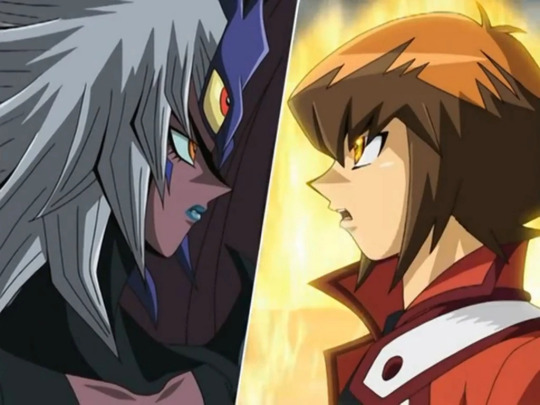
Yu-Gi-Oh GX, an anime that exists to sell you Trading Cards is a also a piece of media with some of the most well-researched, and layered symbols and references to the Great Work in Alchemy. The show is built around it's alchemical symbolism, each of the four seasons representing a step is the Great Work of turning lead into gold.
Season is Nigredo or 'blackening', Season 2 is Albedo or 'whitening', Season 3 is Cintrinatis or 'yellowing' and Season 4 is 'reddening,' where Judai achieves wholeness of the self, and completely his journey of growing from a child to an adult.
Season 3 is the yellowing, symbolized by the color yellow, the element of earth, and where Judai completes his final chemical wedding with his opposite and his soul Yubel.
The entirety of GX s a metaphor for the Great Work, with season 3 focusing on the yellow stage. The group that surrounds Judai represents each of the 4 stages of alchemy.
Manjoume, (Nigredo Black, and Fire)
Asuka (Albedo, White, and Water),
Misawa (Citrinatis, Yellow, and Earth)
Judai (Rubedo, Red, the Philosopher's stone, and Air).
Season 3 depicts the drowning of the king, only for him to be reborn again. The king in this situation being Judai who drowns and rises up as the Supreme King associated with yellow, is defeated and dethroned, only to embrace the Supreme King's power and integrate it into himself.
All of Season 3 is a necessary dissolution of Judai, in order for him to be reforged into a stronger person, the way metal is purified through the process of alchemy. Judai even states in embracing Yubel at the end of the season that even if his previous self was destroyed he's fine with that because it's a part of growing up.
The entire season is themed around solve et coagula (dissolve and coagulate, rinse away the impurities to refine yourself into a better version of yourself / reforge the stone). Letting things dissolve away is needed in order to become purified, the same way that death alway proceeds a rebirth. We will call back to these ideas time and time again over the course of this meta. This symbolism starts in the very first episode of the season 106, where Judai experiences a dream premonition of the future.
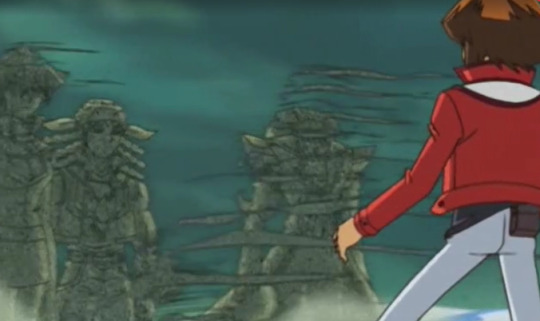
In this dream Judai wakes up in a desert dimension, the same dimension, Yubel will later teleport the academy to. He sees his friends all turned to sand, only for the wind to scatter them on the breeze.
Not only is this a reference to Dissolve et Coagula, but Judai's friends will also literally dissolve later when they are used as sacrifice materials for Super Polymerization, only to coagulate at the end of the season. This scene also takes place in a desert, and earth is the element associated with citrinitas.
The Exchange Students
This episode also features the introduction of the four transfer students, particularly Johan. Each transfer student is associated with an element and a phase in the four step process of Alchemy.
Austin O'Brien, uses a fire deck, associated with nigredo
Amon Garam, uses a water deck, associated with Albedo
Jim Crocodile Cook, uses an earth deck, associated with Citrinatis
What about Johan, you ask?
So far we've been talking about Alchemy as a four step process, but sometimes there is a fifth step called Peacock's tail (The Prismatic Phase).
The peacock tail is a physical stage in alchemy, a brilliant flash of green which comes to signify that the alchemist is one the right path. It can also be recognized in spiritual/psychological alchemy as a flash of visions that come to the adept as they move through the phases of transformation.
The Splendor Solaris painting of Venus / The Peacock is associated with love (the domain the goddess venus presides over), spirit, spiritualism, and inspiriation. II often compare it to the star Major Aracana in Tarot, which is a card of renewed hope and faith and a flash of temporary insight.
What better step fits Johan who not only plays a deck based around seven monsters, which represent the seven colors of light that make up the prismatic rainbow, but also is a character who is capable of seeing duel spirits like Judai.
The most important part of the prismatic phase though is that it's temporary, it's a flash of insight. Johan most notably, after appearing and burning so bright he captures all of Judai's attention disappears halfway through the season.

The search for the yet to be discovered Rainbow Dragon is also what drives both Judai and Johan the first half of Season 3, especially when it becomes their only way to get home. While the search for Johan himself, is what drives Judai in the second half. Johan really is the star in the distance who's light Judai is following.
Judai's first duel against Austin is meant to invoke Nigredo, the boiling away of impurities. Austn uses a fire themed deck, and over the course of the duel Judai helps "purify them" to the point where they remember they're not supposed to blindly follow orders. Austin invokes the fire symbolism by quite literally saying his father was a man who blazed with passion.

I'd forgotten what my father taught me. My father wasn't jsut a dog who fought as he was told. He was a warrior who burned with passion. And he...Judai made me remember that.
Judai's purifying of Austin's soul also starts his character arc here, as he quickly grows from more than just Professor Cobra's willing collaborator.
Kenzan and Jim's duel is a reference to the step of Citrinitas. Kenzan and Jim both duel with earth centered decks, Kenzan's deck revolves around resurrecting dinosaurs, and Jim's deck digs fossils out of the earth. Jim's deck even revolves around fusing summoning monsters in the graveyards, which is a reference to his career as digging fossils deep out of the ground. Kenzan also wears yellow, and when his dinosaur DNA gets out of control his eyes turn yellow. The two of them have their duel on a dry patch of dirt in the middle of the forest.
Cintriatis is referred to as the drawning of the "solar light" inherent in one's being, and that reflective "lunar or soul light" was no longer necessary [source]. What this essentially means is that the subconscious becomes conscious, or we become aware of what we usually keep hidden about ourselves.
Jim's duel against Kenzan references this because the purpose of the duel itself is to wake up Kenzan from a primal, animalistic, subconscious state activated because his Dinosaur DNA went out of control. Jim is basically attempting to show Kenzan the light by calming him down with a duel, something he'll do much later with Judai. A duel between them is a duel betwee instinct and higher reasoning.
The last duel of the exchange students is Manjoume vs Amon. It's a duel that reveals so much and yet so little about Amon's character.
The second stage of alchemy is called albedo, a latinicized term of "whiteness." It's a purification thatfollows after the nigredo stages where all impurities are washed away. It's associated with water.
Amon invokes this stage in several ways. He plays a cloudian deck, clouds are associated with water. Albedo is associated with water because it features the "washing away" of impurities. They duel each other over a a pool of water, in a duel where the loser will be dropped into water below. Manjoume even refers to himself as the lightning going through Amon's clouds, there's only lightning when it rains.
Manjoume: I'm not a spoiled rich dude, casually gazing up at clouds like you were. Manjoume: If you're a white cloud, then I'll be the black thunder.
Albedo is also a stage associated with purification / purity, and the entire duel Amon is remarked upon as being pure / being unreadable like the white clouds themselves.
Manjoume: I'm beating him. It's obvious that I'm cornering him, but... Manjoume: ...What's with this cavelier attitude of his? It's almost like he's like a cloud. Manjoume: I haven't seen him dueling yet. What could he be hiding in those clouds?
Manjoume is also a character associated with Nigredo as he's wearing black, and plays a dragon deck, and the duel ends with him falling in the water.
The exchange student duels end, as the duel academy kids begin hunting down professor Cobra. There's a few moments of interesting elemental symbolism in these duels.
Judai is forced to duel his professor while Asuka, a character who also wears white and is therefore associated with Albedo is about to drown in a chamber slowly flooding with water.
This also doubles ad Jungian symbolism because this is Judai's first confrontation with his jungian shadow the repressed part of his personality. His professor derides him for lacking darkness of the heart. These words speak of Judai's flaws that have previously remained hidden, his selfishness, his unhealthy habit of taking on other's burdens because he lacks a purpose of his own.
Satou: You can't win. I have something that you lack? Judai: Something that I lack? Satou: The darkness of the heart lying deep within a duelist. Judai: Darkness of the heart? Satou: It is what a duelist burdens his heart with. Judai-kun, you lack anything of the sort. Judai: Something I'd burden my heart with? Satou: Thus far, there hasn't been a single duel which I've dueled for myself. ALthough, because you only think only of yourself, I suppose you couldn't possibly understand. Judai: But where's the fun in dueling like that? Satou: There's nothing fun about it! Being burdened with the expectations of others, yet continuing to stay strong. THat's what it was like.
His entire deck strategy revolves around taking control Judai's monsters and turning them against him. His ace monster is also known as "scab knight", a warrior covered in scars from fighting whil enduring the burden of everyone's expectations. Judai will come to resemble this card later on in the season.
I'll make a brief mention of Giese because this is the moment where Johan's role as the peacock feather come into play. Judai asks if Johan has a goal for dueling other than fun, and Johan shares his.
Johan: Those spirits gave me dueling a purpose! A purpose to become a bridge between spirits and humans... Judai: To become a bridge between spirits and humans?
A goal which Judai clearly admires him for. The prismatic phase shows insight, and Johan gives Judai something to aspire to be like because he admires him for having a goal - and for his relationship with spirits. However, it's only a temporary insight because rather than thinking about his own goal it's moments like these, and shortly afterwards in the Cobra duel where Johan tells Judai that he duels while carrying the burdens of others that Judai simply decides to glue himself onto Johan.
Rather than come up with his own answers, Judai just accepts the answers that Johan gives him. Rather than using Johan as support and inspiration, Johan becomes an unstable emotional crutch.
There's one final reference to the Spector Solaris plates in the vial in which Yubel has been baking in the entire arc as they absorb duel energy in order to reconstitute themselves. Yubel at this stage is a reference to the 12th plate, Saturn Dragon and Child.
The plate depicts a child and a dragon sealed together in a flask. Within the child's right hand is a black flask they are forcing down the throat of the dragon, in the left hand are a pair of bellows which he is holding against the dragon's arc. The child is pouring the black Prima Materia in the dragon's mouth, while he increases the heat of flame. This will result in the decomposition of the Prima Materia into a substance that can be reconfigured and rebuilt.
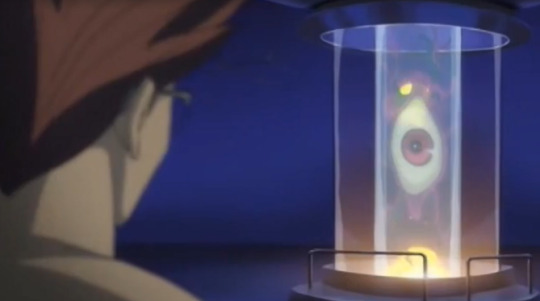
Yubel represents both the child and the dragon. They are a dragon, specifically a child who underwent surgery in order to become a dragon. Just like the child forces their right hand down the dragons throat, Yubel possesses people by grafting their arm onto them.

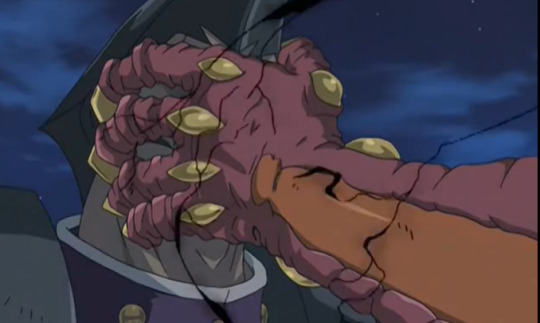
Yubel also specifically appears as a child, Cobra's missing son, in order to manipulate him. Then feasts on the darkness of his heart and induces him to commit suicide by covering Cobra's entire hand with their fiend arm, and feeding them a false memory of a scenario where their son actually survived. They then transport the entiretyof the school to a desert, more earth symbolism and where the series begins referencing the seven parables.
Splendor Solis
The Splender Solis are an alchemical text from around the 1500s. They are a series of 22 elaborate images, which symbolize the alchemical processes.
They are divided into 4 groups. 4 introductory plates which depict the typical archetypal characters appearing in an alchemical story. The 7 parables which describe the process of death and rebirth of the king. The 7 flask plates which show the making of the elixir. Then the 4 final plates which shows the spiritual refinement.
The main arc of Season 3 revolves around the death and rebirth of the king, and from now on this meta will exclusively focus on Judai's process of becoming the awakened Supreme King.
As mentioned above he entire school is transported into a desert world. One of the first major events in this new world is the appearance of a Wise Man.
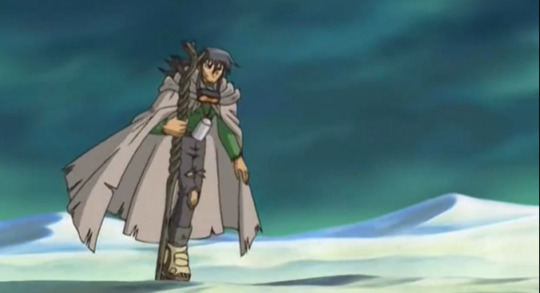
Carl Jung interpreted the process of alchemy as an analogy for psychoanalysis. Each stage of alchemy to him also represented an archetypal schema of the human mind. Nigredo is the shadow, Abledow the anima and animus (feminine and masculine), citrinatis i the wise old man (or woman) archetype, and rubedo is the self that has achieved wholeness.
It's the appearance of Misawa who physically resembles a wise old man, complete with a cloak, long hair and a walking stick that helps clue the protagonist where they are, and how to escape.
I also must make mention of Yubel, who begins enacting their plan to turn Judai into a king. Their first plan involves transporting the academy away to a different dimmension, and slowly taking over from inside by converting the duelists into mindless zombies.
Yubel: Attention, lost duelists. I am the rule of this new world. Yubel: I am the one controlling these zombies as the King of the Martin Empire. Yubel: You are the ones opposing my empire, and doing it well I see...
We don't know exactly what Yubel's first plan was, before they switched to their backup of super-polymerization - but considering Yubel's unique logic they likely planned on converting everyone in the school to zombies, while reforming their body. At which point it would be them and Judai alone together, and they would offer Judai the position as king, which Yubel thinks Judai would be grateful for.
Either way it's Yubel who pushes Judai through the journey of dying and being reborn as king. Yubel goes through a parallel death and rebirth (dissolved) , as they were torn to pieces and enact their plan to reconsitute their body back together and revive (coagulate). Either way Yubel's actions start Judai's journey.
The 7 steps of this journey / 7 parables are:
Plate 5 - Miners excavating a hill
Plate 6 - Philosophers beside a tree
Plate 7 - The drowning king
Plate 8 - Resurrection out of the swamp
Plate 9 - Hermaphrodite with an egg
Plate 10 - Severing the head of the king
Plate 11 - The bath
We'll be going mostly in order with these, as Yu-Gi-Oh GX also references them in order. Here's another post covering similiar spector solis symolism from RWBY which I'm lovingly ripping off. Beginning with:
Plate 5- Miners Excavating a Hill
The search for Rainbow Dragon has been a focus of Johan's arc since his introduction, but when the main characters learn that Rainbow Dragon is their way out of the dark dimension than excavating Rainbow Dragon out of the earth becomes the main focus of Judai and Johan's shared journey.
The plate depicts a mountain mined by two figures, dressed in gold and silver. The contrasting colors represent the dualism of the sun and the moon, which is also shown shining bright in the sky while the moon floats along in the river below.
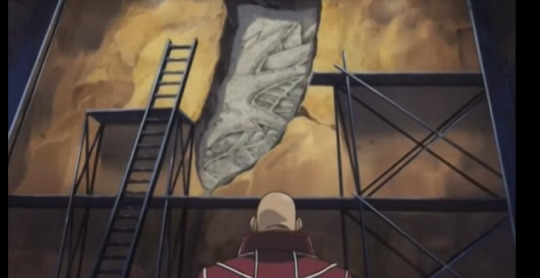
Rainbow Dragon is quite literally mined out of the side of a hill. The two figures could be referencing both, Samejima and Pegasus who are sent out to retrieve it, Johan and Judai who summon it in their partner duel against Yubel.
The number seven also occurs here. There are seven splender solis plates, seven planets, seven alchemical symbols, seven metals, and Rainbow Dragon is a monster that requires the sacrifice of seven gemstones, which also represent the seven colors of light that make up the rainbow.
Featured on the plate is a picture of a scene from the book of Esthter from the Old Testament. This is a reference to the King Ahasuerus and Eshter. THe king is convinced by his grand vizier to kill the jews, starting with executing chief minister Mordecai. This is in spite of the facthe'd already married Mordecai's jewish cousin, Esther.
Eshther appears and touches the king's golden scepter with her hand. This convinces the king not to kill the jews.
“So it was, when the king saw Queen Esther standing in the court, that she found favor in his sight, and the king held out to Esther the golden scepter that was in his hand. Then Esther went near and touched the top of the scepter. And the king said to her, ‘What do you wish Queen Esther? It shall be given to you – up to half the kingdom!’” (The Holy Bible, New King James Edition, Esther 5.3)
It's a union of opposites (gold and silver, king and queen, sun and moon) based upon communication and empathy. Gx references this story in two ways.
When Samejima and Pegasus are trying to excavate Rainbow Dragon from the mountain, Echo appears and threatens to kill everyone inside in order to allow Amon to remain in a world where he can become king. In a way it's gender flopped because Echo is playing the role of king, threatening everyone at Duel Academy.
The second way is a reference to Judai and Yubel's entire arc of learning to understand people with empathy. Yubel threatens to massacre both Judai's friends, and the twelve dimmensions at large in their painfully wounded state from Judai's abandonment.
This is gender flipped like it is with Echo, where the queen (Yubel) is threatening violence, and the king (Judai) is the one who sways them with empathy. They're linked to queen and king roles, Judai serving as the supreme king linked to the sun, Yubel their feminine bi-gender counterpart and shadow linked to the moon, Judai eventually does so through a union of souls during their final duel, which resembles s a jewish wedding.
Plate 6- The Philosophical Tree
The plate shows three philsophers underneath a tree. The third is a youth, climbing a ladder and handing them down a golden branch.
The two philosophers underneath a tree is a reference to the Aeinid, in order to enter the world Aeneas requires a golden branch from a special tree.
A journey to the underworld is as on the nose for a symbolic journey of death and rebirth as it gets. Judai technically journeys to the underworld twice, the first time when Yubel sends the whole school there, and the second when he like Dante or Orpheus journeys into the underworld to retrieve his lost one - Johan.
The desert world that Judai is transported too is literally filled with zombies, or the wandering dead like in classical depictions of the greek Hades.
Whereas in the world Judai travels to find Johan, losing a duel results in a permanent death for the duelist forcing every character to confront their own mortality.
During that Journey, Judai specifically experiences a death of his ego and a rebirth as the supreme king, before dying a second time and being reborn as the fusion of Judai / Yubel.
The three philosopher's under the tree is specifically referenced when Judai and Johan have their tag team with Yubel, they are the three under the tree. During that duel Johan uses gem tree, a tree that grows a fruit after certain conditions - it grows three fruits in total like the three phases of alchemy.

The duel is fought to return everyone from the dark dimension, a figurative underworld. Whereas in the Aeinid the tree is what grants them free passage into the underworld.
The golden branch and yellow flowers in the splendor solis painting also represent the yellow / citrinitas stage, where light is shed on the unconscious. By the end of the duel, not only is Yubel fully reborn after being torn apart, but they also force Judai to recall the repressed memory of them buried in their subconscious. Yubel's colored yellow when begging Judai to remember them.

Plate 7- The Drowning King
Judai's second journey to the underworld begins after this duel, and this time it's fraught with death. Albeit a necessary death for Judai to be reborn as a whole person.
“The Destruction of one thing is the birth of another.” – Aristotle
The painting depicts an old king drowning in the background, while a new king dressed in yellow emerges in the foreground. While the king is begging to the saved, both the old and new king are actually the same person, being reborn again.
GX references the drowning king in several ways, firstly the entire Supreme King Haou arc is a plan by Yubel to break Judai down and reforge him as the Supreme King.
Not only does Judai experience an ego death first where their mind breaks down and they choose to become the Supreme King going forward and rule with power after the loss of their friends. Judai is also the reincarnation of the original supreme king, which is why Yubel is obsessed with them in this lifetime. Which means he's already died once as king and been reincarnated into a second lifetime.
The king drowning in the river is also a reference to the Nigredo stage of alchemy:
Within the stages of physical alchemy there is a set referred to as the drowning king; this is the dissolution step of the Nigredo process. This is when the alchemists would take their chemically calcified ashes and dissolve them into water. The water itself would absorb the ashes, the word we use to describe this solution, an elixir, comes from the Arabic: Al-iksir translates to “from the ashes”. Elixir.
In order to forge the elixir you have to dissolve away all impurities. Yubel prepares a ritual to literally dissolve Judai's friends away, in order to forge Super Polymerization (which will eventually help Judai and Yubel fuse and become the philosopher's stone).
For now though, the ritual requires five sacrifices, and five of Judai's friend. Just like the five steps of alchemy if you count the peacock stage (the monster Judai fights in his duel is even named Reign-Beaux, a pun on Rainbow).
Manjoume, Asuka, Fubuki, and Kenzan all dissolve while Sho escapes leaving the ritual incomplete. It's after the ritual however, that Judai experiences an ego death and is reforged as the yellow king. Ego death, is the Jungian term which means a "Complete Loss of subjective self-identity." In this case symbolically the Judai identity "dies" as he loses his purpose which was previously dueling for the sake of his friends, and he finds a new purpose in dueling for power alone. A power that will simultaneously bring order to the chaotic world of the dark dimension, but also protect himself from his own insecurities and weaknesses.
Nigredo is also meant to be the dissolving of the ego. While many cultures have negative associations tied to the color black (Islam being an exception, where white is considered an impure colour), there are no such connotations for the alchemist about the Nigrido stage; it is merely the first stage in the Great Work, the dissolving of the self/ego complex. It is probably a fair observation that in cultures without spiritual safe-guards, or even safe-guardians (shamans, priestesses, lamas, et. al.), the spontaneous occurrence of Nigrido may be labeled as a nervous breakdown, or even psychosis. Mythcrafts
Nigredo is again associated with the arhcetype of the shadow in Jungian Psychology. The Supreme King persona first appears to Judai as a vaguely person shaped shadow, before taking on his form. The shadow is also a reflection of the self, Judai's internal landscape is a dark placed filled with mirrors.

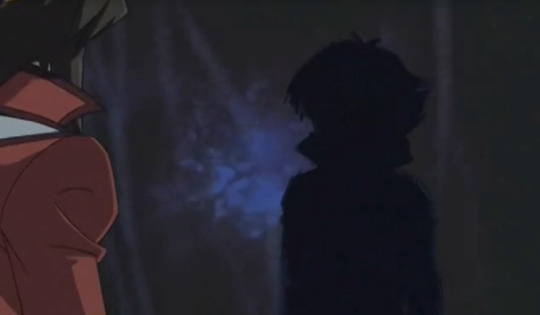
Haou: Yuki Judai. In order to defeat evil, one must become evil. In a world with the law of the jungle at work, one must rule with power. Judai: Power, I don't have that power. Haou: In your hand lies the Super Fusion card. Defeat any spirits who may oppose you, and confine their lives into it the perfect card. Judai: Who are you?

There's also two suns in the background. Judai is referred to as being like the sun, by Sho.
Sho: Aniki, You're too selfish, Aniki. All the time, Aniki, I thought of you like a sun, giving us all strength, able to make the impossible possible. Sho: But I guess I thought wrong. For you, Aniki, things were okay if you were okay. It didn't matter who you sacrificed as long as it all helped your plan! Even if you avenge them, everyone you sacrificed won't come back. Sho: Big bro, you've been dueling just to satisfy yourself. Judai: Sho... Sho: Don't say it like that. You're not my Aniki. You're not my Aniki.
There's two suns depicted in the sky, and this scene we're shown two judais, to show just how divided his self is between his ego and his shadow. Sho even says that he doesn't even recognize Judai and that he's not "His Judai" right now.
Plate 8- Resurrection Out of the Swamp
“She clothed the man with a purple robe, lifted him up to his brightest clearness, and took him with herself to Heaven.” -Trismosin
On the left a strange being, dressed in black and red arises from the mud. He reaches forward to accept a red robe being offered to him.
On the right appears a winged woman, dressed in white, yellow and blue waiting for him to emerge from the mud and giving him a cloak to dress himself.
There is once again many different ways in which this painting is referenced. Haou first appears dressed in armor mainly colored in black, with a red cape exactly like the one the woman is handing the man in the painting.
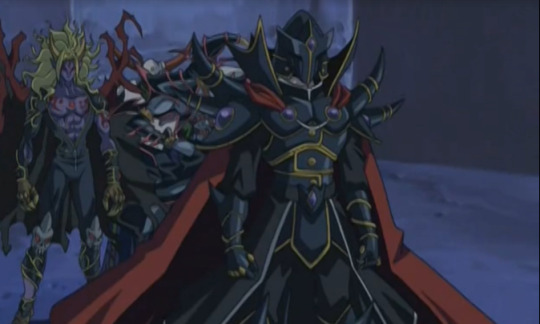
If Judai is the man emerging from the mud, then the winged woman waiting for him is likely Yubel. Yubel is a winged figure and a hermaphrodite who represents both the masculine and the feminine.
On the bank of the river, holding out the red clock to the emerging man is Sophia. She has angel wings of white peacock feathers and is dressed in a floral robe. Upon her head is a crown topped with a six-pointed star, a symbol used in many traditions to signify the union of male and female energies; hieros gamos again.
The masculine king is reuniting with a feminine winged figure. Yubel as a hermaphrodite represents a union of masculinity and feminity. The winged woman is awaiting the man.
Judai's rise as the supreme king is engineered by Yubel as a part of a plan to reunite them. More specifically to get into plot details Yubel sacrificed their body to become a dragon to protect prince Judai in a past life until the day he would become king. After Judai saw Yubel make such a sacrifice he promised them his eternal love, and to eternally love them alone.
Yubel and Judai then both died at some point and were reborn, Judai as a person and Yubel a duel spirit. Yubel was Judai's best friend when they were young and took the role of protector too serously hurting anyone who came near Judai which made Judai decide to send them away (on a satellite into space).
While alone in space Yubel was hit by the light of destruction, which tortured them with terrible agony for ten years straight. Yubel called out to Judai at first, but Judai stopped responding. Ten years later Yubel crashed back down to earth, and when burning up in earth's atmosphere they continued begging for Judai's help only to be met with silence.
They asked why Judai would abandon them and their love, and that silence became their answer. Judai must have intentionally made them suffer both as a show of love, and to make them stronger.
Yubel then resolves to inflict the same suffering on Judai, first making them all alone like Yubel was, then putting them through trial after trial until they died like Yubel and woke up stronger as the Supreme King: at which point Yubel believed they would reunite again as equals. Yubel also had the additional motive of trying to make Judai recall his past life, which Yubel remembered and Judai did not.
Yubel: I was suffering as you came to forget about me... Yubel: It burns... It hurts...It's killing me. But why? I love him so much. Why is Judai treating me like this? Yubel: And then it hit me. This is just a form of Judai's love. Judai is hurting me and making me suffer because of his love for me. But you see, I couldn't possibly forget about you in the time i've suffered. Yubel: So when I solved the riddle that you posed to me, I was delighted. And that fueled my decision. I would try to fill the entire twelve dimmensions with my love for you. Yubel: And once I did you would have to recognize my love for you, wouldn't you? Yubel: That is why I sought to fill all those linked to you - your world - with both sadness and anguish. Yubel: ANd my line of thinking wasn't wrong. Yubel: I mean you are right before my eyes, Judai.


Yubel: Though, I did have your friends help me which pulled out the darkness inside your heart and ushered you this far.
The entirety of Season 3 is Judai's journey of becoming king, which will lead to his eventual union with Yubel, his soul, and his other half.
The union of Judai and Yubel is necessary in a Jungian sense, because his fusion with Yubel mirrors the process of individuation.
The alchemical texts at our disposal offer four distinct stages in the transformation of base metals into gold: nigredo. the black stage, albedo, the white stage, citrinas, the yellow stage, and finally, rubedo, the red stage. Physical chemists took this literally; depth psychologists, following in the footsteps of Carl Jung, took this figuratively. From the standpoint of depth psychology, the black nigredo is the shadow, the things we hide from ourselves. The albedo, the white stage, is the hieros gamos, the sacred marriage of male/female, or anima and animus. The citrinas, the yellow phase, is the wise elder, the shaman. And the red, or rubedo, which seems to be the point of this image, is what Jung called individuation; the point when the raw materia prima of our psyches turns into something whole.
Yubel sort of represents all three of those archetypal schema. Yubel is Judai's shadow, they awakened the supreme king which embodies all of his negative traits his darkness of heart. As a hermaphrodite Yubel is a sacred marriage of male and female, and Judai also fuses together with Yubel becoming a hermaprhodite himself. Finally, Yubel is the wise man by serving as the mind character to Judai's heart.
Heart, Mind and Body are traditional roles assigned to characters in an alchemy story. The male character s usually heart, and their female protagonist is mind. Judai is emotional, hot-headed, and most of all stupid. Yubel is tactical, capable of making succesful plans long in advanced, calm and thoughtful, and also possesses deep insight into things Judai is clueless about like the nature of love. In fact after the two of them are united, it's Yubel who serves an advisory role to Judai the way Aster does with Yuma in Zexal. Heart and Mind characters are often, but not always romantically linked to one another.
Yubel also appears as a wise guide in a twisted sense, as they're the one guiding Judai throughout the whole journey and eventually they reawaken the memories of his past.
Judai therefore needs to unite with Yubel in order for his psyche to be whole.
There's other characters who can also serve as the sophia / wiseman figure in this instance. Jim Crocodile Cook is the first character to fight Judai to try to get through to him. Once again Jim is an archealogist, he likes trying to reach Judai to digging for sleeping fossils under the earth.

He also possesses a special eye, given to him by a wise man which allows him to see inside of Judai's psyche. Jim is quite literally trying to dig Judai out of the mud. When using his power the comet his eye is associated with turns red, like rubedo and the philosopher's stone because Jim is trying to make Judai whole again.
Austin follows through on Jim's iniatitive and succesfully reaches Judai. His fire deck allows for a nigredo of sorts winning with his fire themed deck to boil away the impurities of Judai's soul starting up the alchemical process.
When Judai awakens he's reborn again underneath a tree into a new self, that's both the supreme king and Judai. Another wiseman figure appears to him in the form of Misawa shortly afterwards to highlight to Judai that the Supreme King isn't a split personality, Judai is the supreme king and he did all of that of his free will.
Judai: The supreme king's gone, though... his powers can't be mine. Misawa: Not quite... Your current self and Supreme King Judai are each one side of the same person. We all have a good and evil side. Judai: But... Misawa: Will you quit it, already! You won't be able to rescue the others with powerless heroics! Controlling your powerful Supreme King side will allow you to bring about justice. Judai: The power of darkness? I can't! Just stop it! Misawa: Stop your whining. Someone who was given special powers will have to fight for all those who've placed their hopes on them, won't they?
In that sense Misawa is the Wiseman who appears to guide Judai to integrate the Supreme King into his psyche, to be more whole.
The Nihilixir
Let's take a break from alchemy to talk about reverse alchemy for a moment, because I can't do a Season 3 post without talking about Amon Garam.
The relationship between Amon and Echo form a dark mirror to the relationship between Judai and Yubel. There are many ways they correspond to each other, both features a king (Judai and Amon) and their servant (Yubel and Echo). Amon is named after a sun god (AMon or Amon-Re), he was abandoned in the desert as a child, he's associated with the solar king. Echo is his Echo more or less, she was raised alongside him to be devoted to him, she's named after the nymph echo cursed to be left behind as nothing more than an Echo. She is passive and subservient, Amon is active and dominating.
I once mentioned Echo above threatening to kill everyone present, so Amon can be in a world where he can become king. Just like Yubel it's Echo's deepest desire for Amon to be king, and Echo genuinely believes Amon has the right to stand above others. They're also set up as the only other explicitly romantic couple besides Judai and Yubel. Yubel drops the extremely intimate "aishiteru" to Judai, and Echo confirms she loves Amon with "Aishiteru" when talking with Edo.
Echo and Amon attempt a union, but unlike Judai and Yubel's union it goes wrong, instead of purifying each other they both basically destroy each other.

Instead of forging a philosopher's stone, what Amon and Echo make is what's called a Nihilixir, a negative transformation. The process of reverse alchemy is elaborated on this posts here.
Love’s alchemy had once transformed him to “Sun”--to ”a quintessence even from nothingness.” A normal, positive transformation. But now he has been transformed in reverse. a negative transformation. For I am every dead thing... He ruined me, and I am rebegot Of absence, darkness, death, things which are not.... I, by love’s limbecke, am the grave Of all, that’s nothing. (”Limbecke” is another word for the alchemical vessel, the alembic.) The reverse of the Philosopher’s Stone, the Elixir, is the Nihilixir
While Death and Rebirth is a necessary part of Alchemy, Reverse Alchemy is Death without the rebirth. It's a love which should usually redeem destroying both parties instead.
Kate in this post likens reverse alchemy to the relationship between Oz and Salem from RWBY, an incredibly destructive romance. To paraphrase Kate, death and rebirth is necessary for moving forward in alchemy, but reverse alchemy happens when a character resists death and the grief that comes along with it.
Amon's arc is more or less refusing to feel his own grief. He is undeniably an abused child with a terrible lot in life, left to starve to death when he thinks he's finally saved and works hard to earn his parent's love he is replaced by a biological child and learns how conditional his parent's love is.
Yubel basically takes advantage of all the unprocessed grief that Amon has in order to move him forward to his destruction.
Yubel: My power is not especially great. But those with darkness in their hearts can unleash great power in me. Yubel: The pus welling out of your injured heart forms a second heart. I can see that other heart. The darkness in it. Yubel: The darkness in your heart that has nowhere else to go. You desire life-risking tasks because, all you want is a place to die. Yubel: That’s right. That is the darkness of your heart. it’s there, in the depths of your mind. The cream of your other heart, born from your stagnant blood!
In other words Amon is plagued by thoughts of suicidal ideation and takes on risky missions for the sake of the Garam Conglomerate because he's hoping to just die somewhere far away from his parent's - because he thinks he's been shunned from his family and therefore there's no place for him in this world.
He believes that so thoroughly he even leaves this world and doesn't come back, for a chance to be king in an alternate dimmension free from family obligations.
Yubel says that in order to become whole, to become his true self he would need to "kill his god." More specifically kill his iron will, the resolve he made when his brother was born to only exist for the sake of the Garam conglomerate.
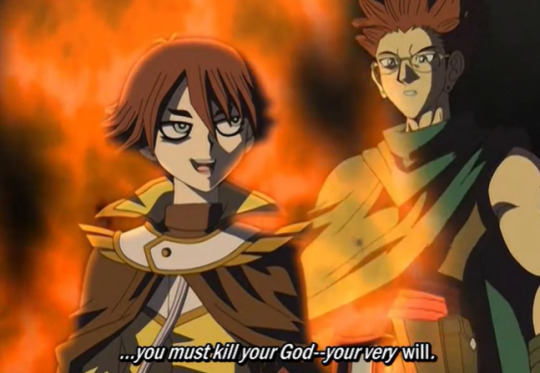
However, you cannot kill your own god. That is because it is the role of a devil.
There's an element of truth to Yubel's words, Yubel is the spirit of wisdom after all. Amon needs to accept death, in order to be reborn as someone new.
Kate basically says where Salem and Oz's relationship goes wrong is that Salem cannot accept death or grieve Oz, and imagine living in a world without him. Which is why she's cursed with immortality, literally becoming undying, and unable to change as well.
Amon cannot accept grief. He's still obsessed with the idea of becoming the head of the Garam family, like he was promised when he was younger - symbolically coming king. He can neither let go of that idea and try to find other ways to be happy in life, or grieve his parent's abuse of him by basically raising him to be a tool only to discard him.
In fact, I believe a lot of people have trouble connecting to Amon as a character because he doesn't openly grieve - he remains stoic b/c he's so dedicated to trying to repress all his pain from his terrible life.
This is another way in which Amon foils Judai, they're both referred to as being pure of heart, and therefore lacking a shadow and darkness. This is not a good thing, Judai's lack of darkness of the heart makes him blind to his own flaws until he hits his lowest point. Amon's so disconnected from his own emotions, he can at one point cruelly lure Echo to her own murder, then five minutes later claim to love her. It's this resistance of grief, and lack of darkness of his heart that makes Amon unable to transform into his better self.
Paralleling Judai yet again, Amon conducts a ritual to sacrifice his loved one in order to forge a powerful card, Superpoly for Judai and Exodia for Amon. However, him and Echo don't die together, it's not a union it's a one-sided affair with Echo taking on all the sacrifice herself. As I said, Amon is unwilling to bear the pain in any way. This is something that Yubel gleefully points out to Amon.
Yubel: I get it now... You weren't in love with Echo. Yubel: No. You may have loved her just enough to clear the conditions in place for you to control Exodia. Yubel: But then, you didn't truly love each other. Yubel: You were only unfairly hurting her, while you would stay unharmed. Yubel: You wouldn't suffer. You wouldn't be in pain.

Yubel: And that's why I'm having Judai go through the same feelings! That could be what it means for us to love!
Again there is an element of truth to Yubel's words. Amon and Echo's relationship was fundamentally unequal and Amon has no desire to change it, and even takes advantage of Echo in that way.
Yubel for all the pain they inflict on Judai desires to be equal in their pains, and their goal is connection and communication which is fundamental to the process of alchemy. Yubel does many things, but they're not resisting grief. In comparison to Amon who shows almost no emotion at Echo's passing, Yubel openly cries on multiple occasions from the pain of Judai abandoning them.
Amon's inability to process his grief of let himself feel pain, or just let go of the idea that he was meant to become his parent's heir and inherit the world - he can't see that he could try to live some other way. He's blind to the people who love him in his life. This is also something that Yubel points out, he could have tried to live a different life from what his family set out for him with Echo. Echo who was always there and loved him. He can't get over his parents lack of love to see there was still love in his life. He can't see a world where he can live without his parent's love.
Yubel: That isn't a world! Yubel: I wouldn't even think of living in a world like that. Yubel: You see, a "world" is something that you build with the one that you love! Yubel: For me, it's something I'll build with Judai! That is a world!
Amon could have created something new with Echo, but he refused to change. Which is why in the end they both destroy each other.
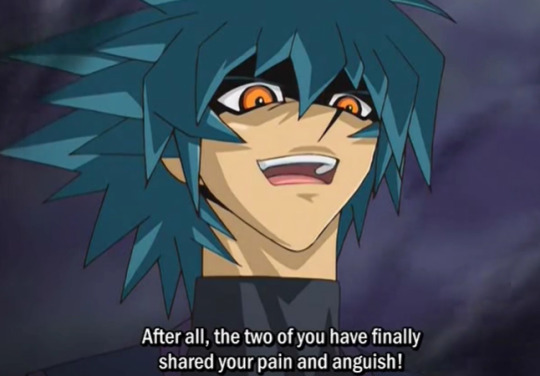
Of course, Judai and Yubel's love isn't exactly a paragon of healthy relationship. Yubel is also unable to imagine a world where they can't live without Judai. However Yubel does allow their beliefs to change after a union with Judai, originally Yubel was so afraid of Judai's rejection they wanted to monpolize all of Judai's attention and essentially live in a world with only them and Judai.
However, after their union in season 4 Yubel is able to accept Judai having bonds with other people doesn't mean that Judai will abandon them.
The parallel with Amon and Echo shows that Judai and Yubel have the potential to destroy each other, but by accepting each other's grief thy both changed for the better instead.
Plate 9 - The Hermaphrodite
The hermaphrodite is the smybol of the marraige of Solar and Lunar (Sun and Moon.) This is usually embodied by a chemical wedding. This post will be shorter, because I already detailed Judai and Yubel's chemical wedding in this post here.
The Splender Solis depicts a winged figure with two heads, one male and one female. The masculine side of the figure is solar symbolism, his radiant shield, his red wing, his golden halo. The feminine side of this figure is lunar symbolism, her white wing, her silver halo, the egg she holds in her hand. Menstrual cycle are lunar, eggs are lunar, etc.
Yubel’s design is a Rebis, split male and female down the middle. It’s even implied in their backstory they were more masculine, and through an alchemical process to become a dragon altered their body to look as such, giving them several feminine traits.
Yubel as one boob and one pec, one muscular leg and one femine leg, speaks in two voices a deep masculine one and a light feminine one, defaults to using masculine “boku”, but plays a feminine role to comparison Judai’s more straighforward masculinity, they even have their face split one side being drawn with eyelashes.
he appearance of the Hermaphrodite comes after what Jung called the Conjunctio, metaphorically the marriage of Solar and Lunar, or the physical marriage of alchemical sulfur and mercury. While the imagery of plate 9 is quite explicit in its depiction of the hermaphrodite, it is subtle in comparison to another illuminated medieval text: the Rosarium Philosophorum (Rode Garden philosophy)
Judai and Yubel also literally duel together in a Rose garden.

When opposites are finally reconciled, the great hermaphrodite is formed. Judai even refers to this as an act of finally purifying the light’s corruption from Yubel’s soul by uniting it with the supreme king’s soul. The union is a purifying process, and the end of Yubel and Judai’s long journey of losing each other and finding each other again.
However, in order to be purified they have to both let their old selves die in order to form something new, the final death but one they experience together. In order to do that both need to experience a dismemberment.
Plate 10 and Plate 11
I'm coupling these two together because the Severing the head of the king an the bath represent the final process of death and rebirth.
Alchemy is violent, Solve et Coagula requires things to dissolve away before they can coagulate together again. Before the psyche can rebuild, it has to be ripped apart. Before a relationship can get better, two lovers need to clash.
The image itself is set in a city in a countryside, a man is holding a decapitated head severed from a body lying at his feet. Both Judai and Yubel experience a dismemberment at one point or another. In another classical alchemical text Lunar King and Queen experience this dismemberment together, in order to represent the violent union of opposites.
Judai experiences Ego death after his friends are dissolved and adopts the moniker of the supreme king. When he's finally snapped out of it, Hell Kaiser takes his helmet off and throws the helmet to the crowd below in a symbolic decapitation.
Yubel is torn to pieces when they re-enter earth's atmopshere, and quite literally are reduced to just a hand the way the body's limbs are all cut off. They need to use duel energy to restore each other. The second time they dissolve in the duel against Judai and Johan and they physically dissolve a second time and need to possess Johan's body in order to recover.
Another feature of the Splendor Solis painting is the kingdom by a river in the background invoking water, and Air which is related to the sword suit in tarot like the sword the main holds.
Judai and Yubel duel atop the clouds (air) and recalls the past when the air starts blowing the clouds away revealing a kingdom by the waterside.

While experiencing the past he recalls the violent surgery Yubel endured to be reborn as a dragon, literally tearing their body apart in a painful procedure.
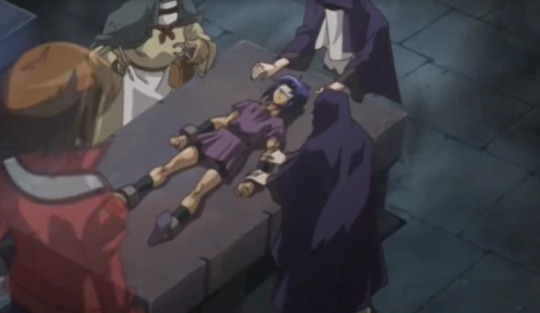
Afterwards Prince Judai touched by the sacrifice Yubel made for their sake, unites with Yubel, promising Yubel their eternal love. He also recalls that he and Yubel were together in their past lives, and therefore they've already experienced one death only to be reborn again and meet each other. Judai: You did this... to protect me. Yubel: It is fine. Protecting you as you grow from a child into an adult is my duty after all. Judai: Yubel, I promise you. My love will only belong to you. No matter what anyone says, I will keep loving you.
The union and promise also take place by the waterside, which is symbolic of the bath which is the final plat of the Solis.
The final image is a man sitting in a bath, with a fire beneath it. The plate is an analaogy for sublimation the boiling fo a substance - Judai experienced a sublimation when the water of the clouds turned to air, in a breeze that revealed his past.
IWhen a bath appear in fiction it's often depicted as a man and woman bathing, though it doesn't necessarily have to involve water. For Judai and Yubel, it's their final union brought about by Super Polymerization fusing their souls together.

Judai even refers to this process of purifying the corruption of the light of destruction by joining his soul together with theirs.
Yubel is not destroyed, but rather pacified with a single touch must like Esther with her king, and ends up giving up on their plans of destruction from one act of communication and understanding.
The parable contains a reference to Medea.
“OVID the old Roman, wrote to the same end, when he mentioned an ancient Sage who desired to rejuvenate himself was told: he should allow himself to be cut to pieces and decoct to a perfect decoction, and then his limbs would reunite and again be renewed in plenty of strength.” (Trismosin 33).
Medea married the hero Jason. When he asked her to strengthen his father, she instead ritually killed him, bleeding his old blood away only to restore him later. Medea's also famous for dismembering her brother so that's kind of fun.
Yubel is a very Medea like figure, the embodiment of a woman scorned, after Jason abandoned Medea to marry a new wife, Medea decided to avenge herself by killing his wife, his children, his new father in law but sparing Jason. Her revenge is making him just as alone as she was. Yubel also cannot bring themselves to kill Judai, but take out their pain on all of his friends so Judai will have nothing left but them.
However, as mythcrafts says:
This image relates the ultimate cost of enlightenment, and the curse of growing up; all growth requires sacrifice. New life demands a little dying.
The path is physically painful. The man in the bath is being boiled. Chemical weddings are violent. Hudai screams out in agony when his soul is being fused with Yubel's. He even says that this fusion might destroy who he is now.



However, acepting that death is what allows both Judai and Yubel to take the first steps into healing together.
The plate is also a metaphor for the Hermes Trismegistus, “it arises from the earth and descends from heaven; it gathers to itself the strength of things above and things below” often shortned to "As above, so below."
Judai and Yubel's chemical wedding in the material world, also radiates to affect the cosmos or the world of the heavens. We see this in the effects of Super Polymerization changing the world around them, as it cuts to several characters in the outside world as the destruction of super poly spreads outward.

However, after the violent process of disolve et coagula is over, the two are empowered by each other to fight the light of destruction together. The change is now spreading out to the cosmos. They begin a journey of atonement which lasts even beyond season 4 and into the rest of their lives, to make up for the destruction they've caused.
Judai's friends who've been dissolved away finally return at the same time, and even Judai who is pronounced dead makes a return by the next episode changed into a fusion of himself and Yubel.
Death and rebirth, Grief and healing, all of Yubel's grief even dissolves away into tears as they finally let go of the idea they need to hurt others as much as they've been hurt.
Also because this is citrinitas the entire scene is dyed yellow. By accepting Yubel into his soul, Judai has transformed the dark night into a solar light. THe sun has risen for them both, as the lunar queen reunites with the solar king, they are no longer servant and master but equal.
The third stage, citrinitas, brings forth the light of the sun (the masculine), a light which magically transforms the shadowy and fearful subconscious into valuable consciousness. From the dark night of rubedo, to the pale morning light of albedo, the sun rises in citrinitas to the culmination of day in rubedo.
As Judai and Yubel depart together, we finally move onto the fourth stage of alchemy Rubedo where Judai and Yubel become one whole self!
I'll elaborate more on that on my next alchemy post though, because alchemy is still a four step process and there's still more to come for Judai / Yubel.
#ygo meta#yu gi oh gx#yu-gi-oh gx#judai yuki#soulshipping#yubel#alchemy#yu gi oh gx meta#yu-gi-oh#yu gi oh#jaden yuki
71 notes
·
View notes
Text
the reason i would love an arknights collab with alchemy stars and specifically love the idea of doctor and navi being friends doesn't have anything to do with how one has far too much blood on their hands that they don't remember and the other was literally born to be a weapon meant to enslave their friends, it has to do with how doctor is a wily little freak who manages to seduce even the most embittered hard-asses possible with their guile and whimsy and how navi is a small little hater hard-ass who manages to seduce an entire army of wily little freaks chock full of guile and whimsy. if they ever met it would literally be the unstoppable sword vs the unbreakable shield, a quantum singularity of seduction where the overthinking amnesiac would be unable to seduce the oblivious psychic and yet said oblivious psychic would be unable to hold down the overthinking amnesiac
#zerav meme#zerav meta#arknights#alchemy stars#i had more thoughts but this is The Funny Post#doctor#navigator
226 notes
·
View notes
Text
Chemical Weddings: White Knight
Here it comes my second short meta on RWBY's chemical weddings. It is White Knight's turn! Feel free to skip the introduction, if you have already read it in my previous post (or if you already know what a chemical wedding is)
WHAT IS A CHEMICAL WEDDING?
A chemical wedding is a motif used in alchemical stories (aka stories, with symbols related to alchemy). It is a metaphorical union between characters and it represents two opposites coming together. Think of it as a motif that comments on a relationship and describes how it changes throughout a narrative. It shows how two characters' bond develops and how they integrate qualities of each other. Even if it is called "wedding", the union doesn't necessarily have to be romantic, but often it is. Like in RWBY's case.
RWBY uses chemical weddings to develop romantic relationships. How does the series do it? This meta by @hamliet explains it perfectly:
It uses some alchemical imagery (like plates from alchemical texts as reference)
It employs elemental motifs (water, fire, air and earth), which are keys to alchemy
It integrates other symbolism, like romantic subtext or fairy tale references
Both hamliet and I have already talked about RWBY ships and chemical weddings, so this short meta is just a quick review of White Knight’s ones, with some integrations.
Here are Whiteknight's posts, that I am going to reference:
Weiss and Jaune's foiling throughout the series
White Knight and Arkos (+ Whiterose)
White Knight's scenes in volume 9
White Knight's chemical wedding 2.0 by hamliet
Now, let's dig into White Knight's two (for now) weddings.
WHITE KNIGHT'S WEDDINGS
White Knight's weddings make use of this imagery:

There is a Mercurius (entity representative of change), who unites a man and a woman through impaling one of the two.
This is what happens to Weiss and Jaune twice:
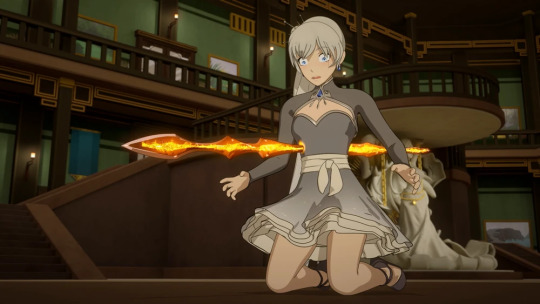
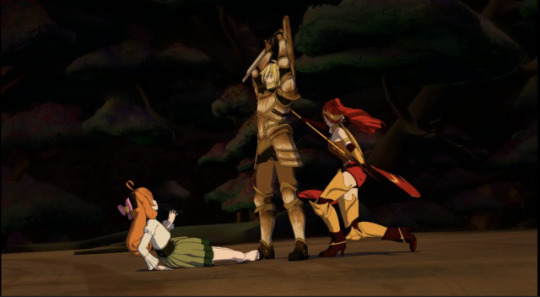
In Mistral Cinder impales Weiss and in the Ever After the Curious Cat impales Jaune. Not only that, but both Cinder and the Cat make sure Weiss and Jaune indirectly hurt each other.
Cinder takes Jaune's heroic remarks and uses them as an excuse to mortally wound Weiss:

The Cat tricks Weiss into physically hitting Jaune:
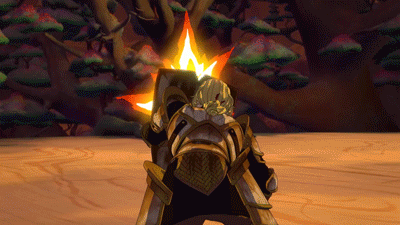
These parallelisms lead us to two considerations:
The two weddings are inversions: this isn't any news because in RWBY the second wedding is always an inversion of the first. Still, when it comes to White Knight, this inversion is particularly through and it ties with an important motif of theirs. Weiss and Jaune are strong mirrors of each other.
Cinder and the Cat (our two antagonistic Mercurius) force Jaune and Weiss into specific gender roles. Both mock Jaune (the knight) and use Weiss (the damsel). This isn't by accident and it ties with the archetype explored by White Knight, aka that of the Anima/Animus.
MIRROR MIRROR = ANIMA + ANIMUS
Weiss and Jaune's weddings mirror each other in multiple ways. Let's see how.
Weiss and Jaune's first wedding starts with Cinder impaling Weiss and leaving her to die. Jaune rushes by her side and activates his semblance to save her. The whole scene ties in their respective fairy tale symbolism. As a matter of fact Jaune performs a miracle as Jeanne. Weiss instead gets resurrected by the Prince and crowns herself Queen Snowhite through the Queen Lancer.
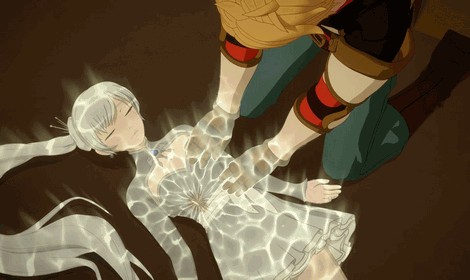
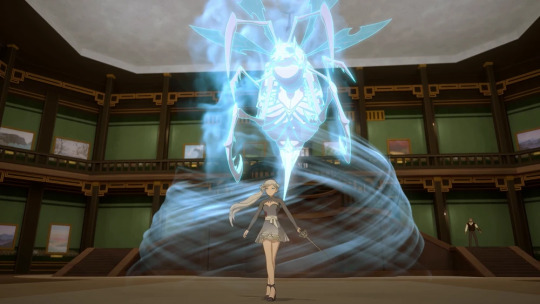
Weiss and Jaune's second wedding starts at the end of volume 8, when Cinder defeats them both and reiterates their trauma. She forces Jaune to kill a maiden and targets Weiss to hurt Winter. She is also the reason why Weiss and Jaune end up together in the Ever After, where their wedding reaches its climax. In this magical world, Weiss guides Jaune towards self-realization and metaphorically has him fall, so that he can integrate Alyx and resurrect. Their interaction in volume 9 references another alchemical text, knowns as the Splendor Solis. Specifically, it alludes to this plate:

This plate has:
2 miners excavating a hill (a metaphor for making the stone from the prima materia). It is important that the two characters wear respectively a golden and a silver robe, which call back to the Sun and Moon
The Sun and Moon mirroring each other. The Sun is in the sky (air) and the Moon is in the river (water). They are opposites balancing each other
Eshter's story pictured in the frame of the pedestal. Eshter is a biblical character and the second wife of King Ahasuerus, who is determined to kill the Jews. Still, Eshter (a Jews herself) steps in, touches the King's staff and convinces him to let her people live
The plate's theme is the beginning (prima materia) of a union (sun and moon) through communication (Eshter's parable).
It is referenced here:
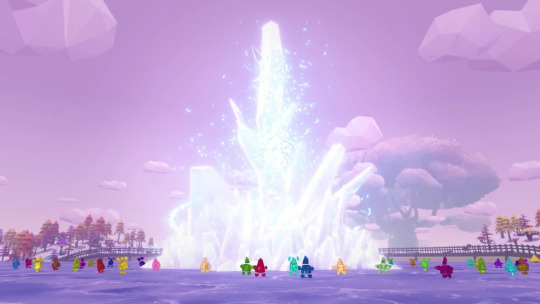
The Genial Gems create a giant white hill, which clearly alludes to the philosopher stone. Jaune and Weiss play the Solar King and the Lunar Queen:
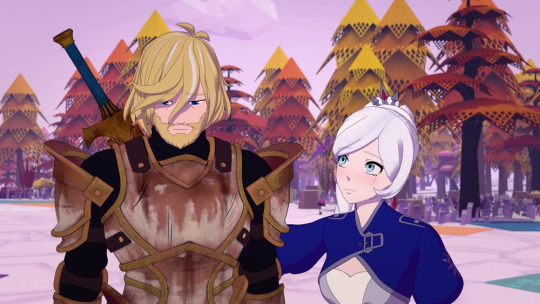
Jaune is linked to the sun and masculine (gold), while Weiss to the moon and feminine (silver). They grow closer thanks to empathy.
In particular, their interaction is an inversion of King Ahasuerus and Eshter's. In the biblical episode, the King wants to kill the Jews and Eshter stops him. In RWBY, Jaune doesn't want to let the Paper Pleasers ascend and Weiss tries to get through to him (together with BY):
Weiss: Then why do you care so much about this village?! Jaune: Because I can actually PROTECT these people!!
Just like Esther touches the King's staff, Weiss grabs Jaune's sword:
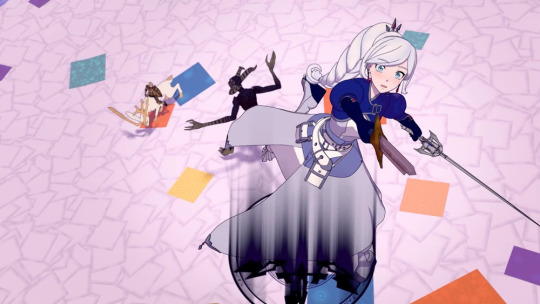
Eshter's gesture is a symbol of intimacy and connection. Similarly, using another person's weapon in RWBY shows closeness.
In short, both weddings are rich of symbolism, but the first focuses on the fairy tale allusion, whereas the second explores alchemical imagery. This isn't the only difference, though, as the two situations are perfect parallels/inversions of each other:
In Mistral, Cinder kills Weiss to hurt Jaune, whereas in Atlas, she forces Jaune to kill Penny. Moreover, both times she negates Weiss's agency and uses her as a pawn to hurt someone else (Jaune and Winter).
In Mistral, Jaune and Weiss go through a crisis together, but they emerge victorious. In Atlas/Ever After, Jaune and Weiss lose, but grow closer as they come to terms with this defeat.
In Mistral, Jaune hurts Weiss because of his psychological issues, but saves her physically. In the Ever After, Weiss saves Jaune psychologically, but hurts him physically. Both are responsible for the death and resurrection of the other.
In Mistral Jaune unlocks his semblance (changes spiritually), whereas in the Ever After he becomes young again (changes physically). Both in Mistral and in the Ever After Weiss ends the wedding by unlocking a new summon. She conjures the Queen Lancer in Mistral and the Nevermore in the Ever After.
In Mistral, Jaune is led by Pyrrha towards his ideal-self, whereas in the Ever After, he is led by Weiss towards his real-self. Symbolically, he goes through two stages of the anima integration. From Pyrrha/Mary (devotion and idealism) to Weiss/Sophia (understanding and reality).
In Mistral, the resurrected Weiss unlocks her Queen Lancer, which is key to fighting Hazel. In the Ever After, Jaune integrates Alyx and is reborn after a trial of fire. Once he comes back, he is key in defeating Neo and the Cat with his plan to separate them. Both do not "win" the conflict, but are instrumental to its solution (Weiss through heart and Jaune through mind).
In general, both times Jaune and Weiss make important steps to integrate their anima/animus, which their bond represents. The anima/animus is the feminine (anima) and the masculine (animus).
In Mistral:
Weiss integrates her animus and summons a Queen Lancer, an entity which is both queen (feminine) and knight (masculine)
Jaune integrates his anima (feminine) by discovering himself a healer (traditionally feminine quality)
In the Ever After:
Weiss integrates her animus by acting as Jaune's Knight. She summons her Knight while fighting side by side with him. Moreover, throughout the whole volume Weiss looks for someone who can guide her home. It turns out in the climax she herself is the guide, the knight, who leads Jaune and the others to the tree. As a matter of fact she is the one who teaches the others the theme of "acceptance".

Jaune integrates his anima by accepting he is no hero (no Knight) and by realizing Alyx is a part of himself. He faces her and integrates her spiritually (her vision in the smoke) and physically (her knife):

In volume 9, both Weiss and Jaune regress and go back to their stereotypical selves. Weiss is stuck as the damsel and Jaune rusts as the knight. However, they move on thanks to each other. They are reborn.
WHITE KNIGHT= REBIRTH
The focus of White Knight is rebirth (coagula). In Mistral they get a victory and in Atlas they get a loss. Still, both weddings climaxes in resurrections. Weiss is reborn in volume 5 and Jaune is reborn in volume 9. Not only that, but after White Knight's Ever After wedding Ruby herself is reborn:
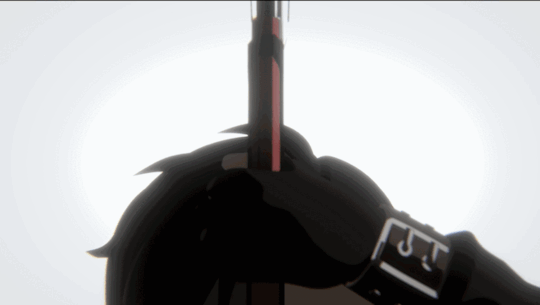
This renewal of the self is celebrated by a full Nevermore:

This marks White Knight's second wedding as their nevermore wedding, which has them overcome grief through love.
NEVERMORE
Weiss summons her full Nevermore in the finale. This Grimm is tied to both Ruby and Jaune.
It is symbolic of Ruby's rebirth, as it is the first Grimm team RWBY killed together and Ruby landed the final blow. Weiss is able to manifest it because by the end her team is whole again and Ruby is back.
It celebrates Jaune and Weiss's wedding, as our Lunar Queen conjures it after her interaction with Jaune. Their exchange is the pivotal moment for Weiss in volume 9, as she helps herself by helping Jaune. She teaches Jaune to forgive himself and learns to forgive herself at the same time. As a result, she unlocks this summoning, which is symbolic of the self:

Its glyph is in fact a mix of all the other ones, as Weiss is a sum of all her avatars.
Jaune too makes a decisive step towards the self:
Alyx: Maybe it’s time for a change, to be the kind of man you always wanted to be.
He accepts Alyx and gets a second chance to grow up as a result:
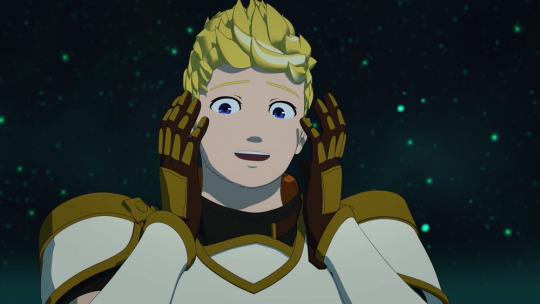
His new self has a white streak of hair to show he has successfully integrated with Weiss (white) and has obtained wisdom.
FROM UNCONSCIOUS TO CONSCIOUS
There is one final difference between White Knight's two weddings. The first has Weiss and Jaune's metaphorical union happen unconsciously. The second instead has this process become conscious. Let's consider this:
In Mistral Jaune instinctively activates his semblance and Weiss unconsciously unlocks her summon. Their actions happen because of internal and unconscious changes that are not elaborated on. They are quick transformations and the wedding itself is quick.
In the Ever After Weiss consciously encourages Jaune. By doing so both characters find a catharsis for their unconscious feelings. They make them conscious. Similarly, Jaune can consciously face Alyx and integrate with her. Weiss's own summoning is not quick and raw, but it is the result of a process that starts in volume 8 (when she fails to materialize the Grimm), goes on in the chess fight (she has the wings appear) and is finally complete at the end of volume 9 (the full Nevermore manifests itself). The wedding is also very slow and distributed throughout two volumes.
This choice makes sense, as Weiss and Jaune's dynamic is about them slowly realize who they are and who the other is. They have been each other's mirrors since the beginning and as they better understand themselves, they can better relate to the other and accept them.
#rwby#rwby chemical weddings#chemical weddings#white knight#weiss schnee#jaune arc#rwby meta#rwby alchemy
51 notes
·
View notes